With 2 days in Cairo and Giza, you have enough time to visit the Pyramids of Giza, explore the amazing Egyptian Museum, and walk through Islamic Cairo. But what if you want to skip some of the sights in Cairo and go on a day trip instead? You can do that, too.
Here are two different ways to spend 2 days in Cairo and Giza.
On itinerary #1, visit the highlights of Cairo and Giza: the Pyramids of Giza, the Egyptian Museum, Coptic Cairo, and Islamic Cairo. On itinerary #2, you will visit the Pyramids of Giza and the Egyptian Museum but you will also take a day trip to Dahshur and Saqqara. In the afternoon of day two, take your pick between Coptic Cairo or Islamic Cairo.
Itinerary #1: The Best of Cairo & Giza
2 days in Cairo gives you enough time to explore the city without feeling rushed. You won’t go on any day trips in this itinerary (see itinerary #2) so this is the perfect itinerary if you want to explore Cairo and Giza at a leisurely pace without organizing a day trip.
Make sure you read our article 15 Best Things to do in Cairo, which covers the best things to do in Cairo in greater detail than this post. Plus, it gives you a few more spots to consider visiting on your trip to Cairo.
How to Use This Map: Click the icons on the map to get more information about each point of interest. To take this map with you, click the star next to the title of the map which adds it to your Google account. Next, within your Google Maps app, select ‘Saved’ and then select ‘Maps’. This map title will now appear in your list.
Day 1: Pyramids of Giza & the Egyptian Museum
Morning: The Pyramids of Giza
For many visitors, the Pyramids of Giza top the to-do list in Egypt. This is the perfect place to start your tour of Cairo and Giza.
Nine pyramids, the Great Sphinx, and a collection of smaller tombs sit on the Giza Plateau, also called the Necropolis of Giza. The Great Pyramid of Giza (also known as the Pyramid of Khufu), with its two neighbors, the Pyramid of Khafre and the Pyramid of Menkaure, form one of the most iconic sights in Egypt, if not the entire world.
The Great Pyramid of Giza is the oldest of the Seven Ancient Wonders of the World and it is the only Ancient Wonder to remain largely intact.
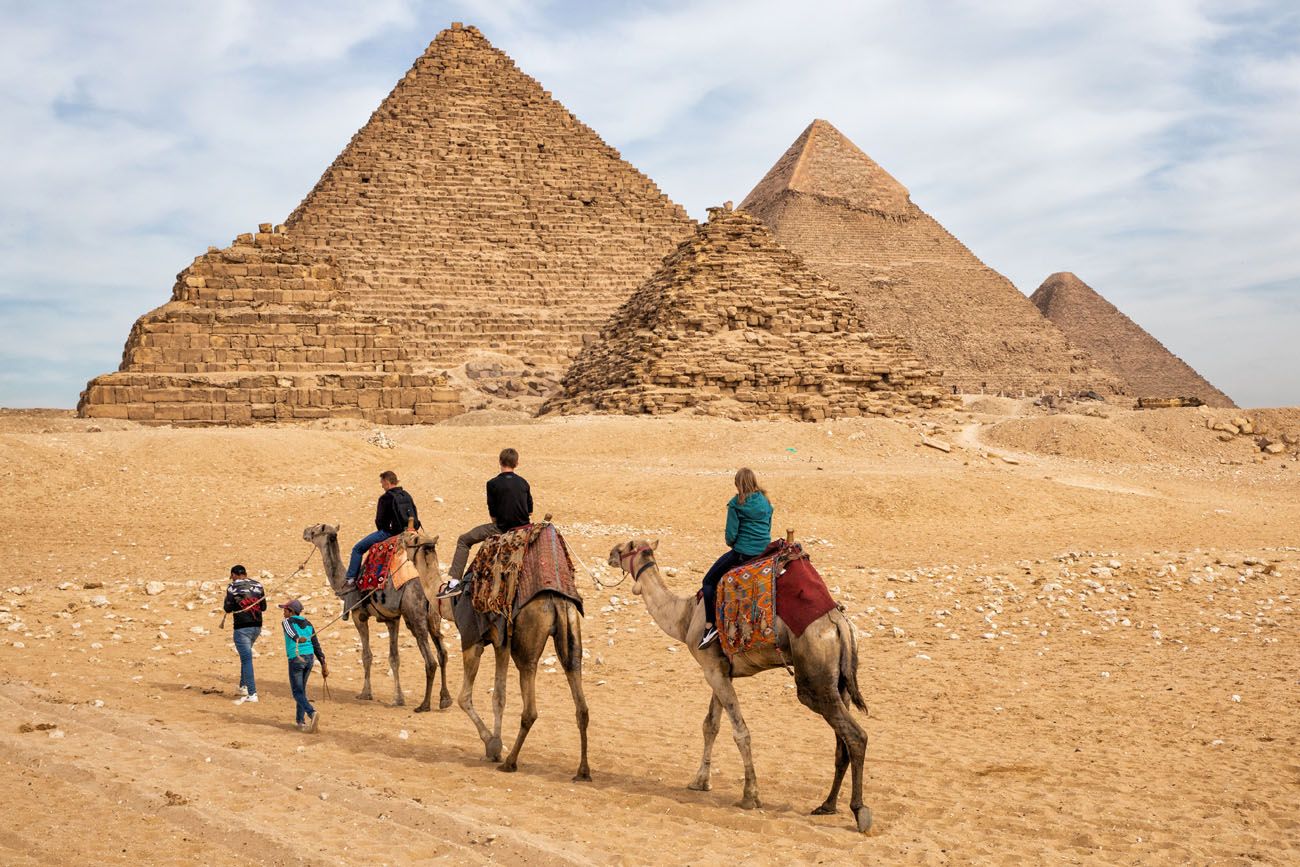
Things to Do at the Pyramids of Giza
We recommend spending a minimum of three hours on the Giza Plateau. While you are here, walk around the base of the Great Pyramid, take a selfie with the Sphinx, go inside one of the pyramids, and take in the view from Panoramic Point.
Start your day by 8 am to avoid the crowds and the midday heat. Most people arrive at 10 am and it stays busy until closing time at 5 pm. There is a chance that it could be hazy in the morning, especially during the winter months, but I think that it is worth a visit at this time, to avoid the big crowds.
Price List for the Giza Plateau
Giza Plateau Entrance Ticket: 700 EGP per adult, 350 EGP per student (with valid ID)
Entrance Ticket to the Great Pyramid: 900 EGP
Entrance Ticket to the Pyramid of Menkaure: 280 EGP
Learn more about how to visit the Pyramids of Giza with these articles:
Midday: Lunch
Within walking distance of the Giza Plateau are two good restaurants, both are located on Abou Al Hool Al Seiahi, near the Sphinx entrance into the Giza Plateau. Koshary Hekaya is a good, cheap eat that serves Middle Eastern and Egyptian food (it can be hard to find according to reviews, check Trip Advisor for more information). Just a short walk from Koshary Hekaya is Pyramids Restaurant, which also serves the same cuisine but at a slightly higher price.
Another spot to try is Felfela Village, where you can have amazing falafel (located near the Marriott Mena house so you will need to drive to get here).
Afternoon: The Egyptian Museum
In the afternoon, visit the Egyptian Museum, which contains the world’s largest collection of Egyptian artifacts. Highlights of a visit include seeing the solid gold mask and the golden sarcophagi of Tutankhamun, the Royal Mummies room, and an amazing number of statues, jewelry, and treasures.
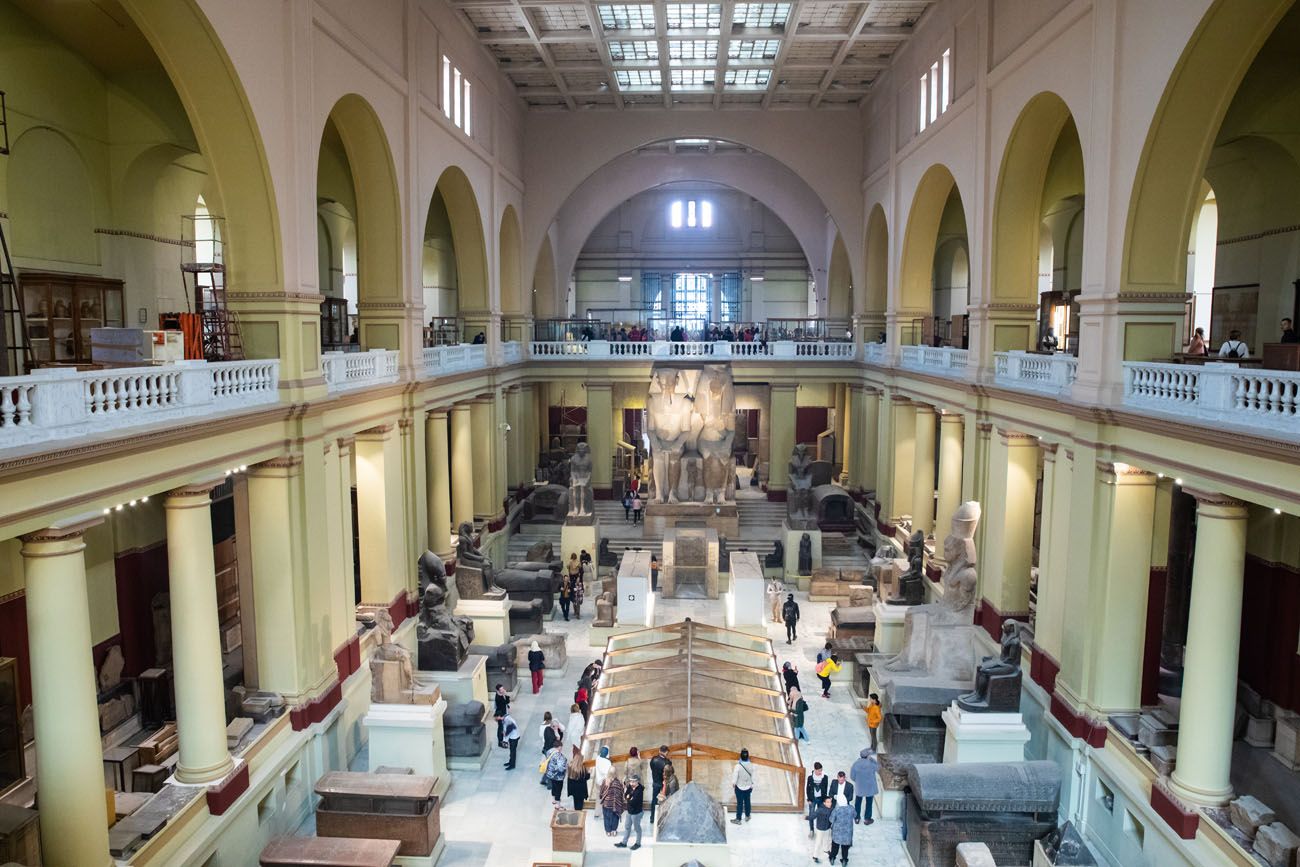
A visit here typically lasts two hours. The Egyptian Museum is located on Tahrir Square in Cairo. To get here, we recommend hiring a driver and guide, but you can also use Uber, a taxi, or public transportation. It takes roughly 30 minutes to travel between the Giza Plateau and the Egyptian Museum.
IMPORTANT NOTE: The Grand Egyptian Museum is expected to open in 2025, although this date seems to change frequently. Once open, it will replace the Egyptian Museum on Tahrir Square. The Grand Egyptian Museum is massive…it’s so big that our guide, Laila, joked that you would need a tuk-tuk to see all of it. This museum is also conveniently located next to the Giza Plateau, so it will be very easy to combine these two sites without needing to navigate the streets of Cairo.
Evening: Dinner
After your visit to the Egyptian Museum, you can return to your hotel, go out to dinner, or visit one more spot in Cairo.
If you still have a little more energy, we have one more worthwhile place to visit. From the Egyptian Museum, walk through Tahrir Square to the Qasr al-Nile Bridge. Walk across the Nile River, enjoying views of the city. Once on the opposite side of the bridge, it is just a short walk to the Cairo Tower.
From the top of the Cairo Tower, you get a bird’s eye view over the city. On a clear day, you can see the Pyramids of Giza. If you want dinner with a view, there is a revolving restaurant on top of the tower that serves good food and drinks. The Cairo Tower is open daily 9 am to midnight.
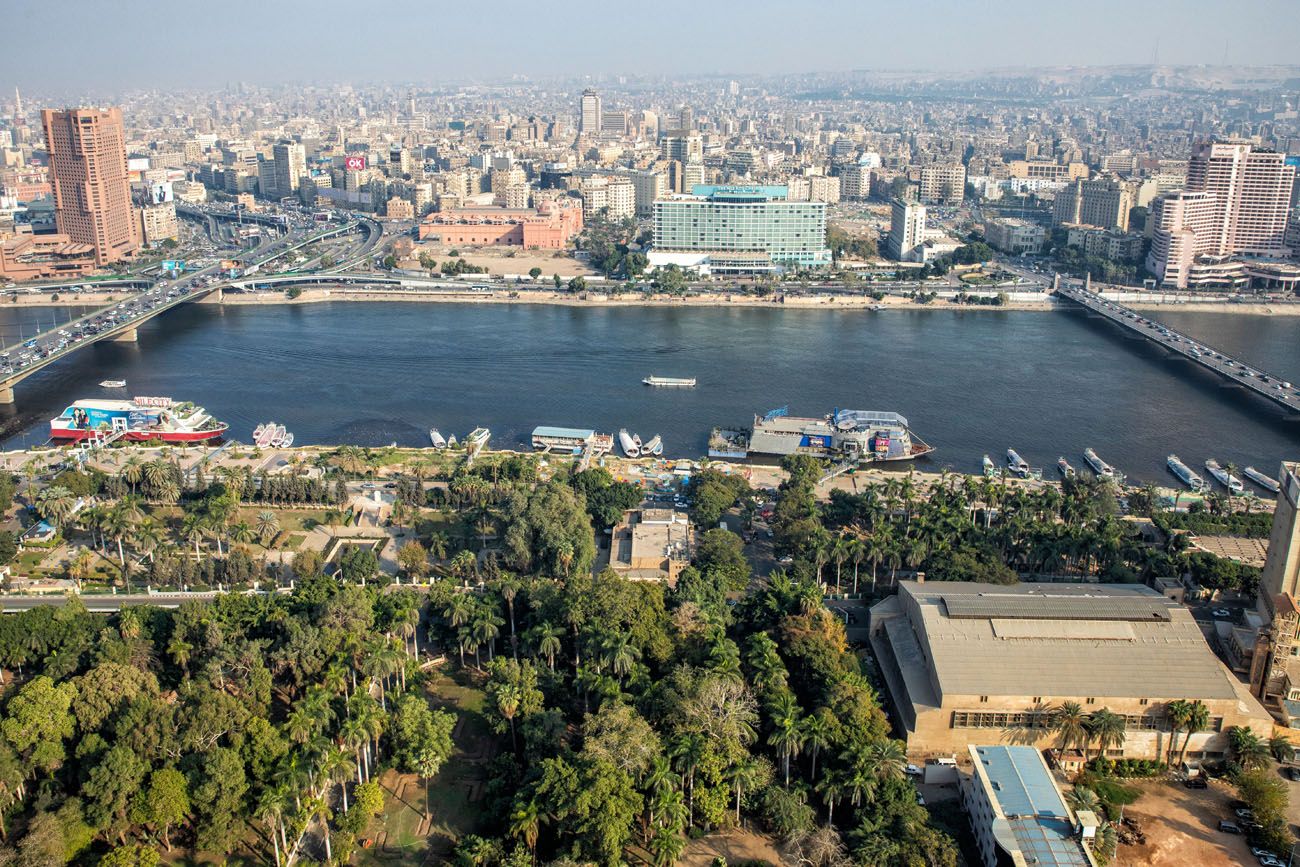
Recommended Restaurants: Near the Egyptian Museum, we recommend Osmanly Restaurant (Turkish and Mediterranean), Sabaya (Lebanese), and Le Deck by Laurent Peugeot (French restaurant with great views of the Nile River).
Day 2: Historic Cairo
Today you will visit several of the oldest areas in Cairo, Coptic Cairo and Islamic Cairo.
Morning: Coptic Cairo
Coptic Cairo is located in Old Cairo in the southern part of the city. The first settlements here date back to the 6th century BC. Many of the places to visit here originate from Egypt’s Christian past, but you will also visit a synagogue and the first mosque built in Africa.
All of these sites are within walking distance of each other and are free to visit (with the exception of the Coptic Museum). Most people spend about two to three hours here.
The Hanging Church
The Hanging Church, also called Saint Virgin Mary’s Coptic Orthodox Church, is one of the oldest churches in Egypt. It is named for its position above a gatehouse of the Babylon Fortress, the Roman Fortress in Coptic Cairo. This is the most famous church in Coptic Cairo.
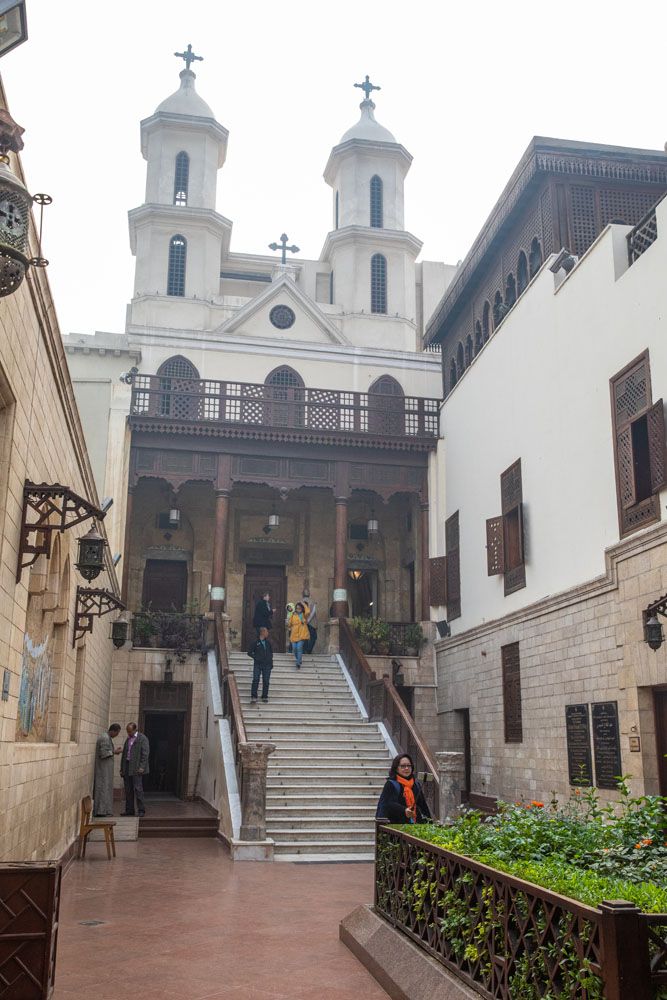
The Church of St. Sergius and Bacchus
This is believed to be the place where the Holy Family (Joseph, Mary, and Jesus Christ) sheltered at the end of their journey into Egypt. The interior of the church is beautiful, with detailed woodworking and tilework.
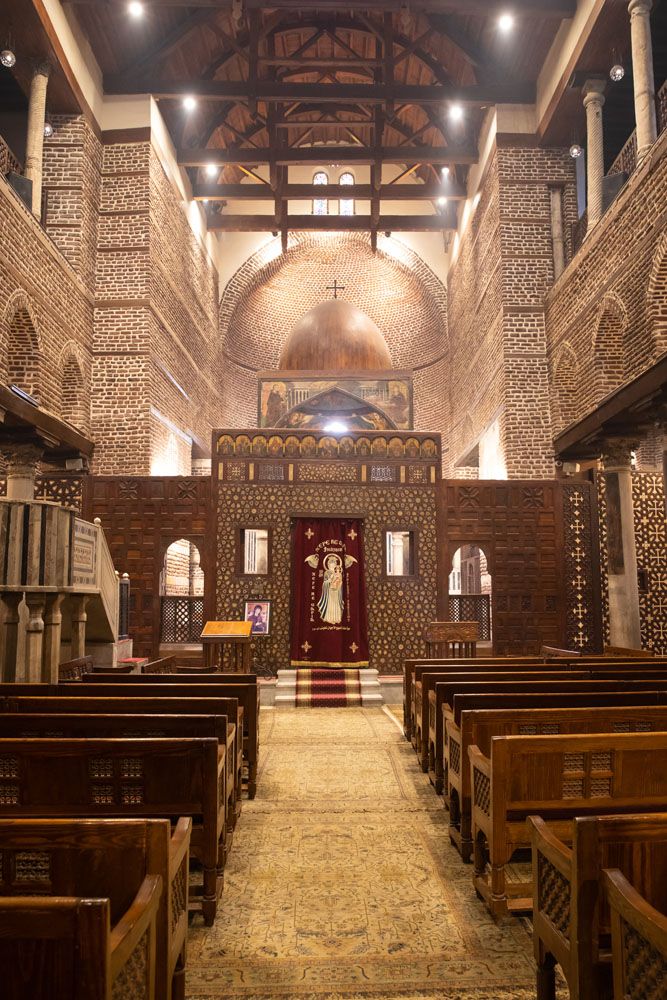
Ben Ezra Synagogue
This synagogue started off as a church. In 882, it was sold and converted into synagogue. It has been rebuilt and remodeled several times in the past 1000 years. It is said that this is where the baby Moses was found.
Mosque of Amr Ibn al-As
This is the first mosque built in Egypt and Africa. It was built in 641 to 642 AD.
Coptic Museum
This museum is home to the world’s largest collection of Coptic art work.
Afternoon & Evening: Islamic Cairo
Islamic Cairo is the historic heart of Cairo. This area contains one of the largest collections of historic architecture in the Islamic world. Numerous mosques, madrassas, fortifications, and tombs date from the Islamic era of Egypt (639 to the early 16th century), making Cairo one of the world’s oldest Islamic cities.
In 1979, Islamic Cairo became a World Cultural Heritage Site.
Islamic Cairo is packed with things to see and do. It’s a fairly large area, located near the city center. It takes at least one full day to visit everything in Islamic Cairo, but with just the afternoon, you can see the highlights.
Islamic Cairo can feel chaotic and overwhelming, but the sights, the food, and the people make this the most interesting part of Cairo, in my opinion.
For the full list of things to do in Islamic Cairo, read our article 15 Best Things to do in Cairo, Egypt.
With just the afternoon, I recommend a visit to Salah El Din Citadel, a walk along Al-Muizz Li-Din Allah Al-Fatima Street (al-Muizz for short), climb the minaret at Bab Zuweila, and explore Khan el-Khalili. If you are really feeling ambitious, you can also visit Mosque-Madrassa of Sultan Hassan and Al-Rifa’i Mosque, two mosques that sit side by side near the Citadel.
Salah El Din Citadel
From its strategic position on the Mokattam hills in central Cairo sits the Citadel of Saladin. The main attraction is the Mosque of Muhammad Ali. The mosque was completed in 1857, in memory of Tusun Pasha, Muhammad Ali’s oldest son. It is modeled after the Blue Mosque in Istanbul.
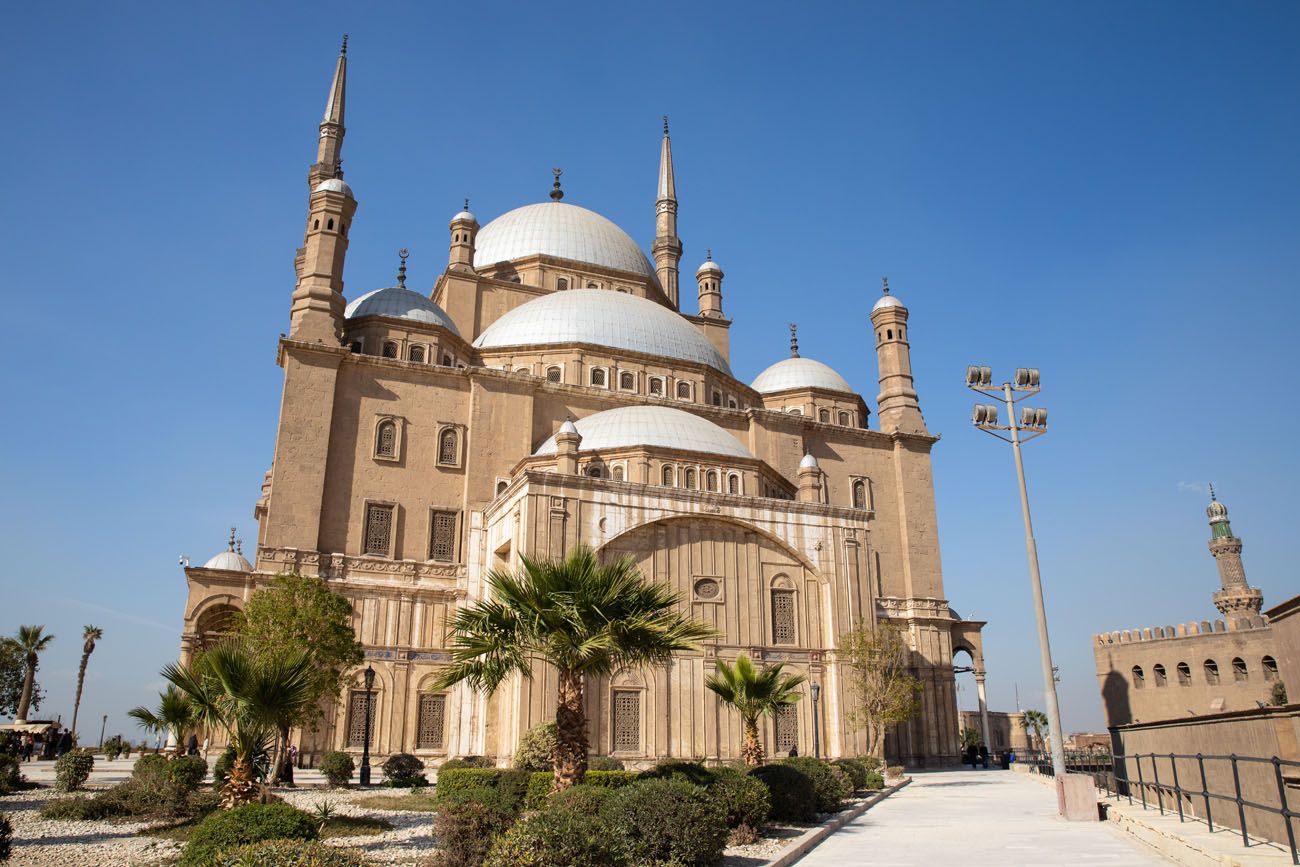
While at the Citadel, make sure you visit Gawhara Terrace for one of the best views over the city. From here, you have a great view over historic Cairo, Mosque-Madrassa of Sultan Hassan, and Al-Rifa’i Mosque. On a clear day, you will be able to see the Pyramids of Giza.
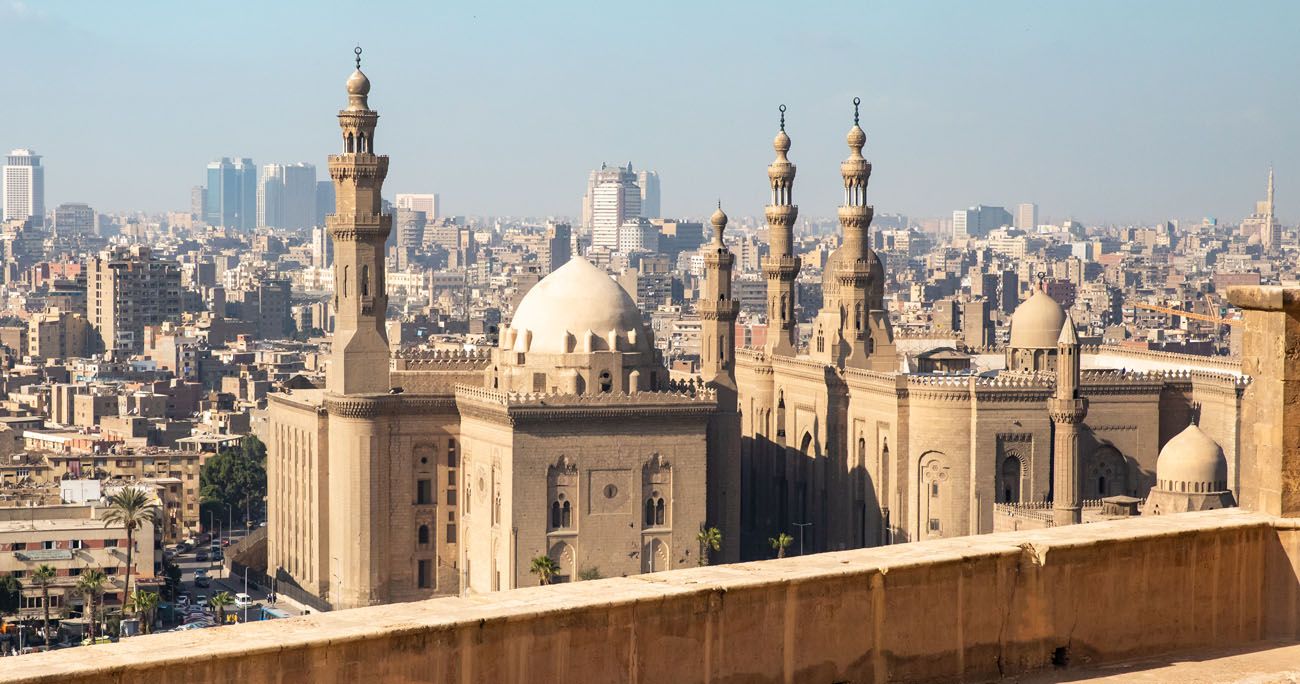
Planning Your Visit
Cost: 550 EGP adults; 275 EGP student with valid ID
Camera Ticket: None, you are permitted to take photos with a camera at no extra charge
Shoe Covers: 5 EGP; before entering the Muhammad Ali Mosque, you will need to remove your shoes. You can take them with you (free) or pay 5 EGP to keep your shoes on but wear shoe covers
Scarf: Women need to bring a scarf to cover their head
Hours: 9 am to 4 pm
Al-Muizz Street
This is one of the oldest streets in Cairo. It runs north-south through Islamic Cairo and it contains some of the most important monuments of historic Cairo.
This street is roughly 1 km long, running from Bab Zuweila in the south to Bab al-Futuh in the north. It is a busy, congested, noisy street and for some visitors it can feel overwhelming. Along this short stretch of road are an astonishing number of madrassas, mosques, shops, markets, and hammams.
Walking al-Muizz was one of our favorite experiences in Cairo. It can be sensory overload, in a good way, in my opinion. Yes, it’s noisy and chaotic, but the people are friendly, the street food is delicious, and to walk down one of the oldest streets in Cairo is an unforgettable experience.
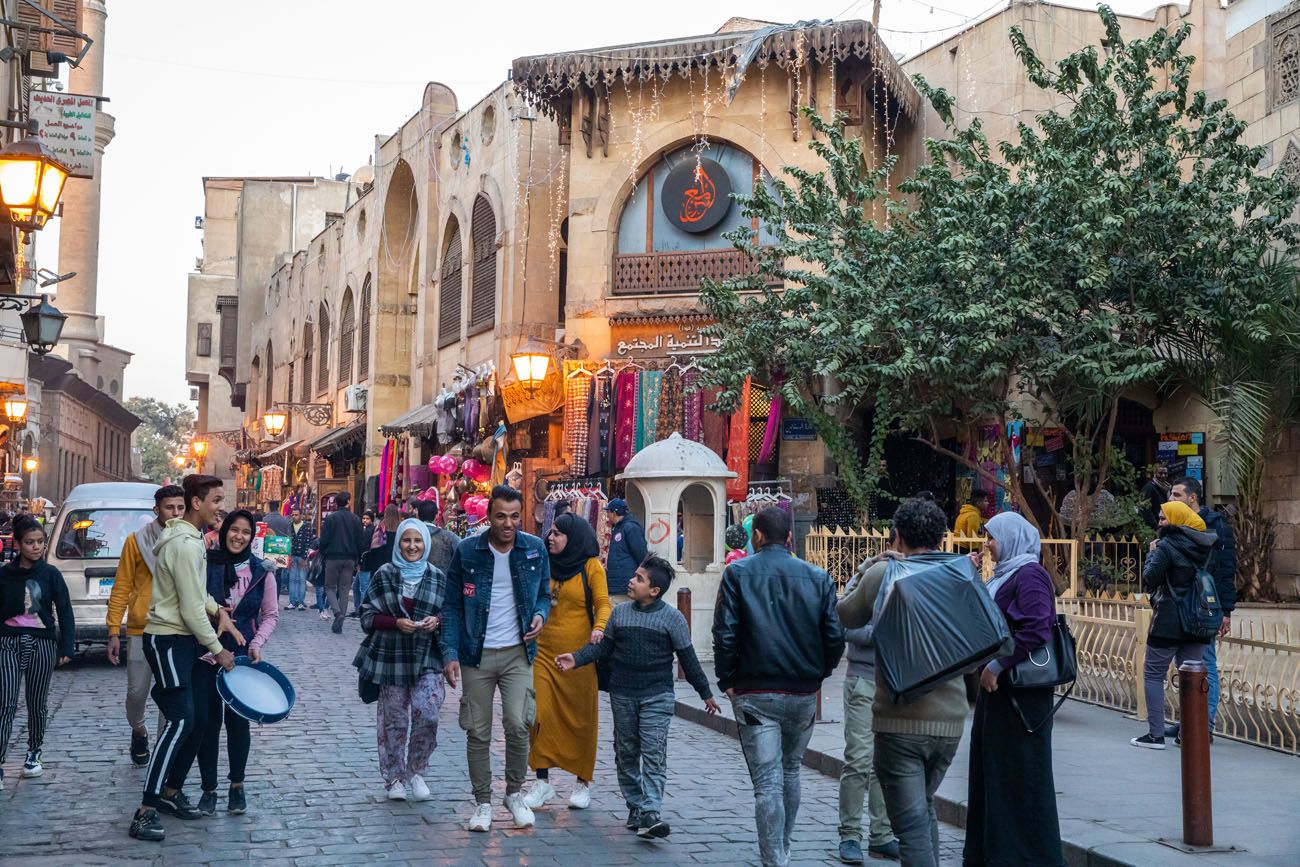
Climb the Minaret at Bab Zuweila
Bab Zuweila is the southern gate on the walls of Fatimid Cairo. It dates back to the 11th and 12th centuries and it is one of the last remaining gates of the Old City of Cairo.
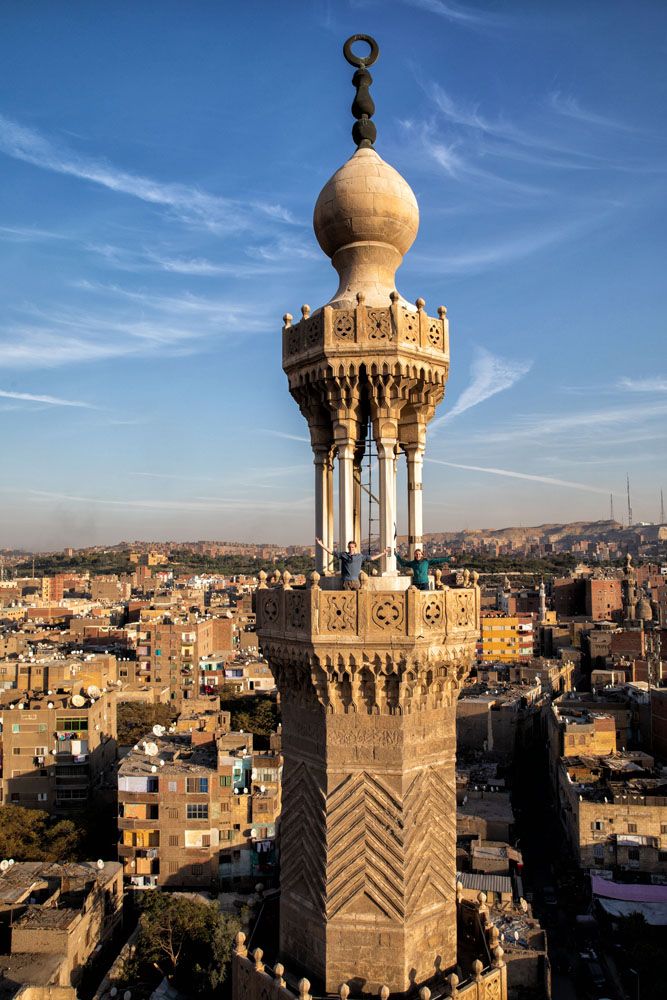
PRO TRAVEL TIP: A very narrow, spiral staircase winds its way up to the top of the minaret. Without any windows, it is almost total darkness for a short part of the climb, so make sure you bring a flashlight (the flashlight on your phone is sufficient). To step out onto the ledge, you will have to climb up one last narrow metal narrow staircase, step over a gap, and then climb over a waist-high wall. Skip the minaret climb if you suffer from claustrophobia or are not nimble enough to climb over the wall. Young kids should also skip this climb.
Khan el-Khalili
Khan el-Khalili is the famous shopping market in Islamic Cairo. It sits just off of al-Muizz street.
Mosque-Madrassa of Sultan Hassan and Al-Rifa’i Mosque
These two mosques sit side by side and can easily be visited together.
Mosque-Madrassa of Sultan Hassan is an enormous mosque that sits near the base of the Citadel. It was built between 1356 and 1363 during the Mamluk period.
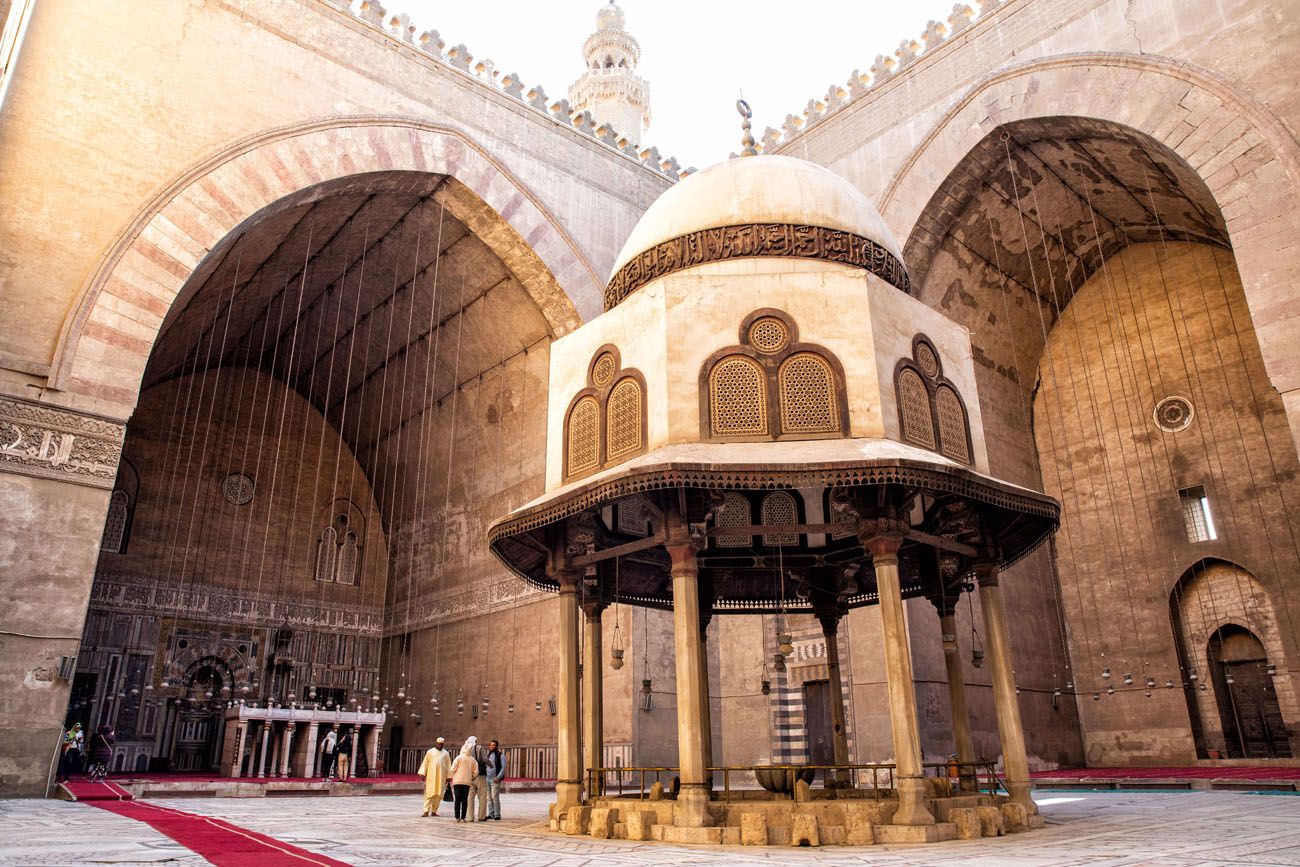
Next door is Al-Rifa’i Mosque. It was constructed between 1869 and 1912 and commissioned by Lady Khushiar Hanim to expand and replace the existing shrine of the medieval Islamic saint Ahmed al-Rifa’i.
Itinerary #2: Ancient Egypt
On this itinerary, you will visit several of the oldest and most recognizable sights in Egypt. These include the Pyramids of Giza, the artifacts in the Egyptian Museum, and the pyramids in Dahshur and Saqqara.
Day 1: Pyramids of Giza & the Egyptian Museum
This day is the same as day 1 in Itinerary #1. Visit the Pyramids of Giza in the morning and the Egyptian Museum in the afternoon.
Day 2: Dahshur & Saqqara
Just a short drive from Cairo sits several of the oldest pyramids in Egypt. This is where the ancient Egyptians perfected their pyramid-building skills. For those looking to tour some of the oldest sites in the world, or for those looking to add a little adventure to their tour of Cairo, this is a great way to spend your time.
Morning: Dahshur, Memphis & Saqqara
Dahshur
Plan on leaving Cairo/Giza by 8 am. It takes about an hour to drive to Dahshur.
In Dahshur, you will see (and have the option to go inside) two ancient pyramids, the Bent Pyramid and the Red Pyramid.
The Bent Pyramid was the first attempt at building a smooth sided pyramid. It was constructed between 2613 and 2589 BC under the rule of King Sneferu. It gets its name from the different angles of inclination. The pyramid rises out of the sand at a steep 54 degrees and then abruptly changes to a shallower 43 degrees, giving it a “bent” appearance. Archaeologists believe that the angle of the pyramid was changed in order to prevent its collapse.
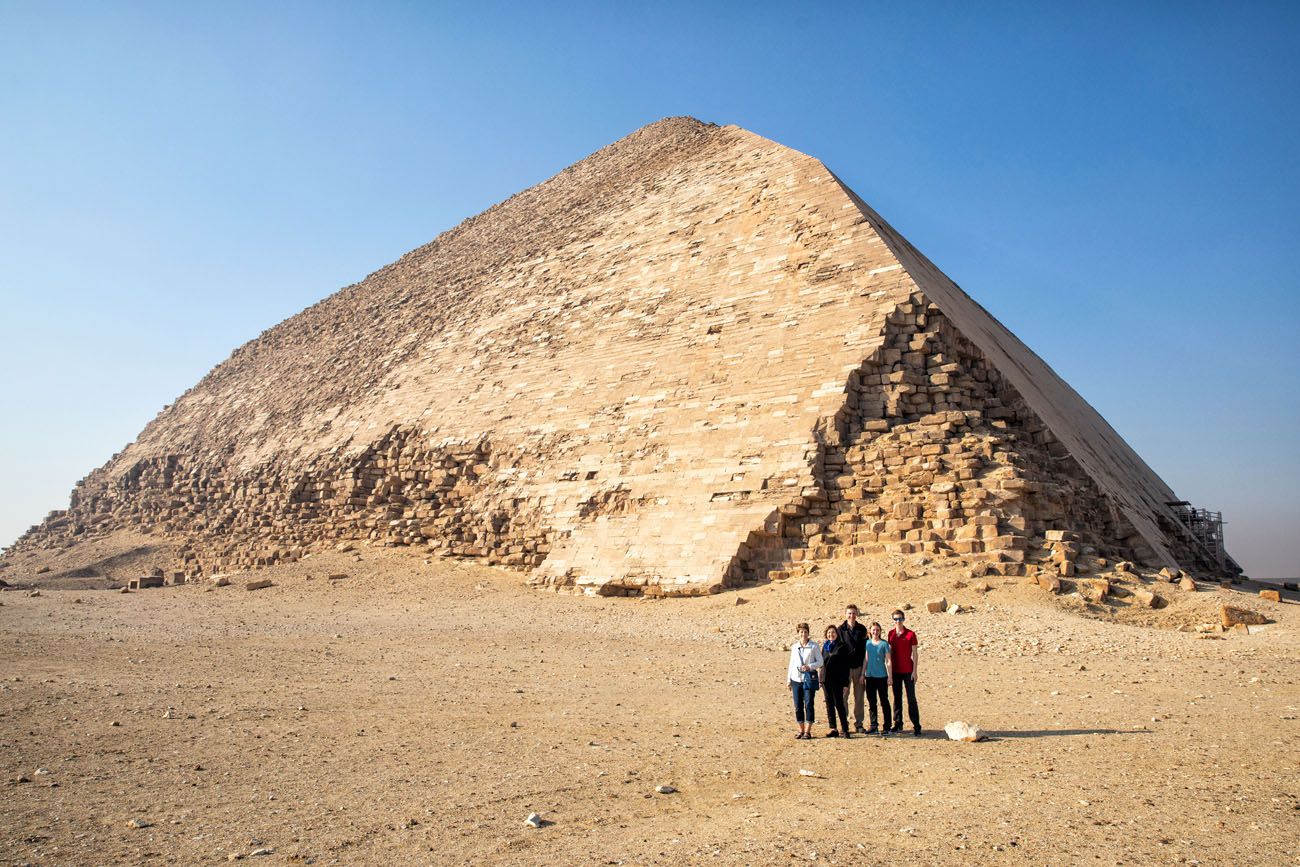
Once it was discovered that 43 degrees was the magic number, King Sneferu ordered the construction of a second pyramid, the Red Pyramid. This was the first smooth sided pyramid to be constructed. It gets its name from the red limestone that was used in the construction of the pyramid.
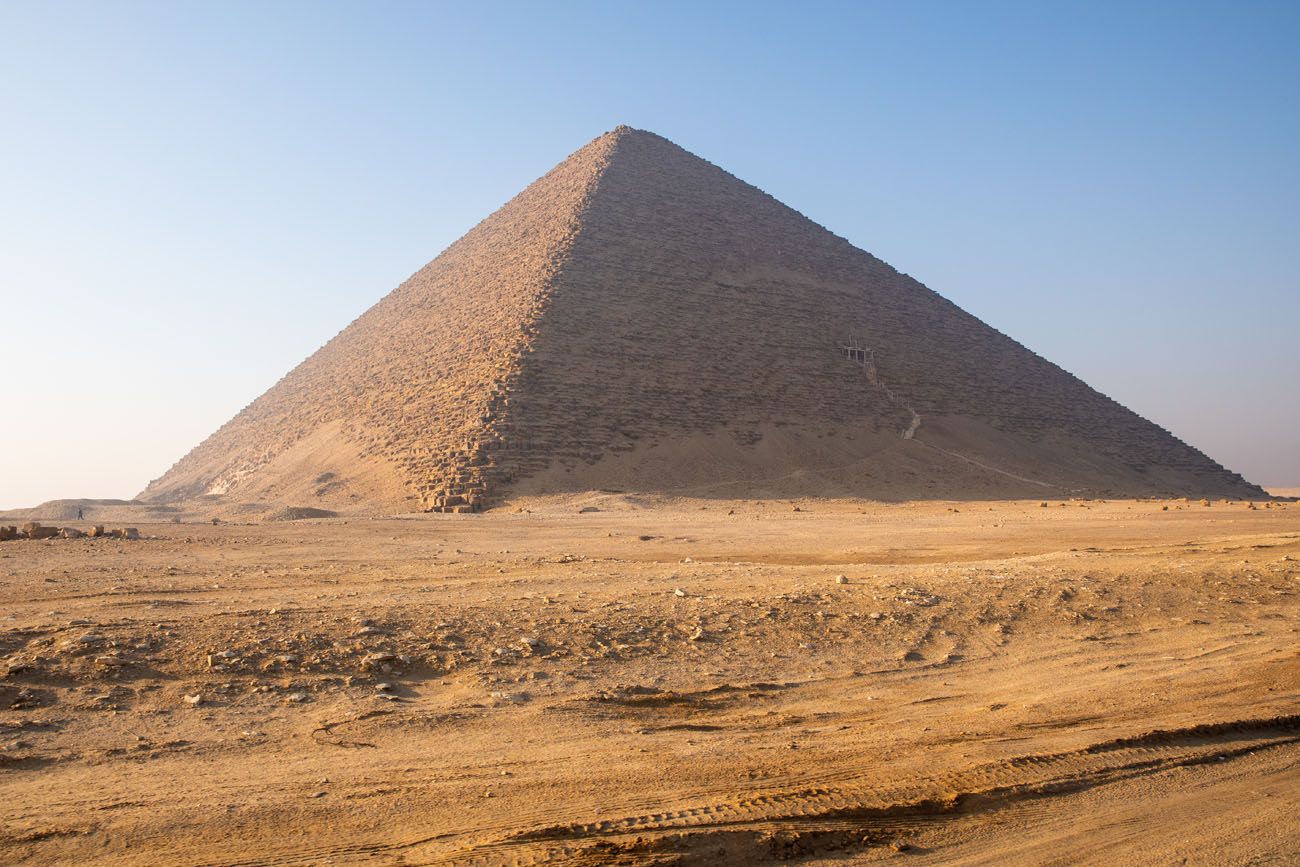
After King Sneferu’s death, his son, Khufu, went on to build the Great Pyramid of Giza.
Going Inside the Pyramids
Touring the pyramids of Dahshur feels like an adventure. To get inside of the pyramids, you will descend down tight, steep tunnels and then explore the ancient chambers inside of the pyramids. In some ways, it’s much more thrilling than a visit to the pyramids of Giza. It’s also much less crowded.
To get into the pyramids, you will first have to climb up a long set of stairs. Next, you will descend down a long, tight tunnel to get into the main chamber. Those with claustrophobia and those who have problems with their neck, back, or knees should consider skipping a visit inside of these pyramids.
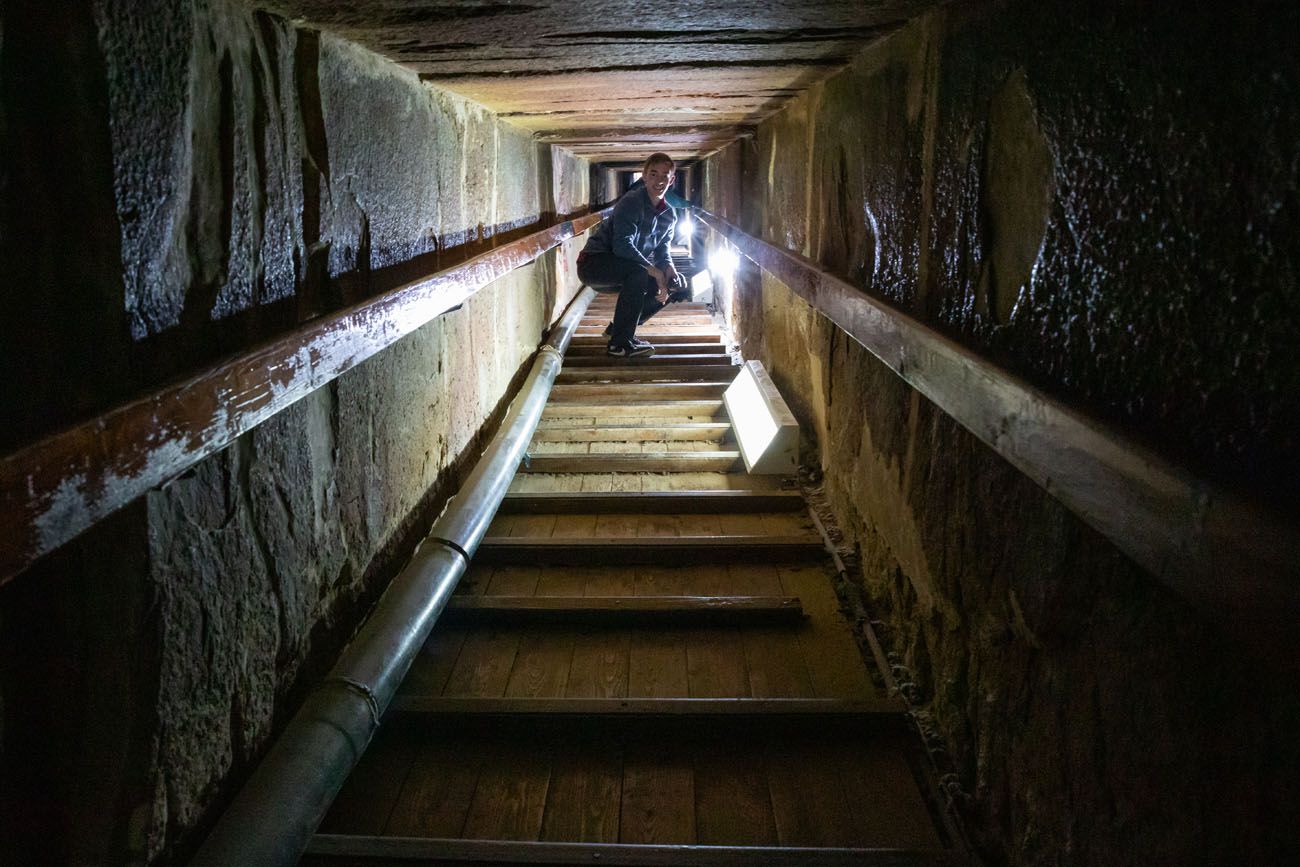
Tyler in the tunnel of the Red Pyramid.
I recommend starting your visit at the Red Pyramid. The tunnel is shorter and easier to walk through in the Red Pyramid. It’s a good test to see if you can handle the tunnel into the Bent Pyramid, which is longer and narrower and more difficult to walk through.
Dahshur, Memphis and Saqqara Day Trip from Cairo
How to plan a day trip to Dahshur, Memphis, and Saqqara.Memphis
Memphis was the first capital city of Egypt, and some records state that it could have existed as far back as 6000 BC.
What remains today are the foundations, the stumps of pillars, and some statues, which you can visit in the open-air museum that is located in the village of Mit-Rahineh.
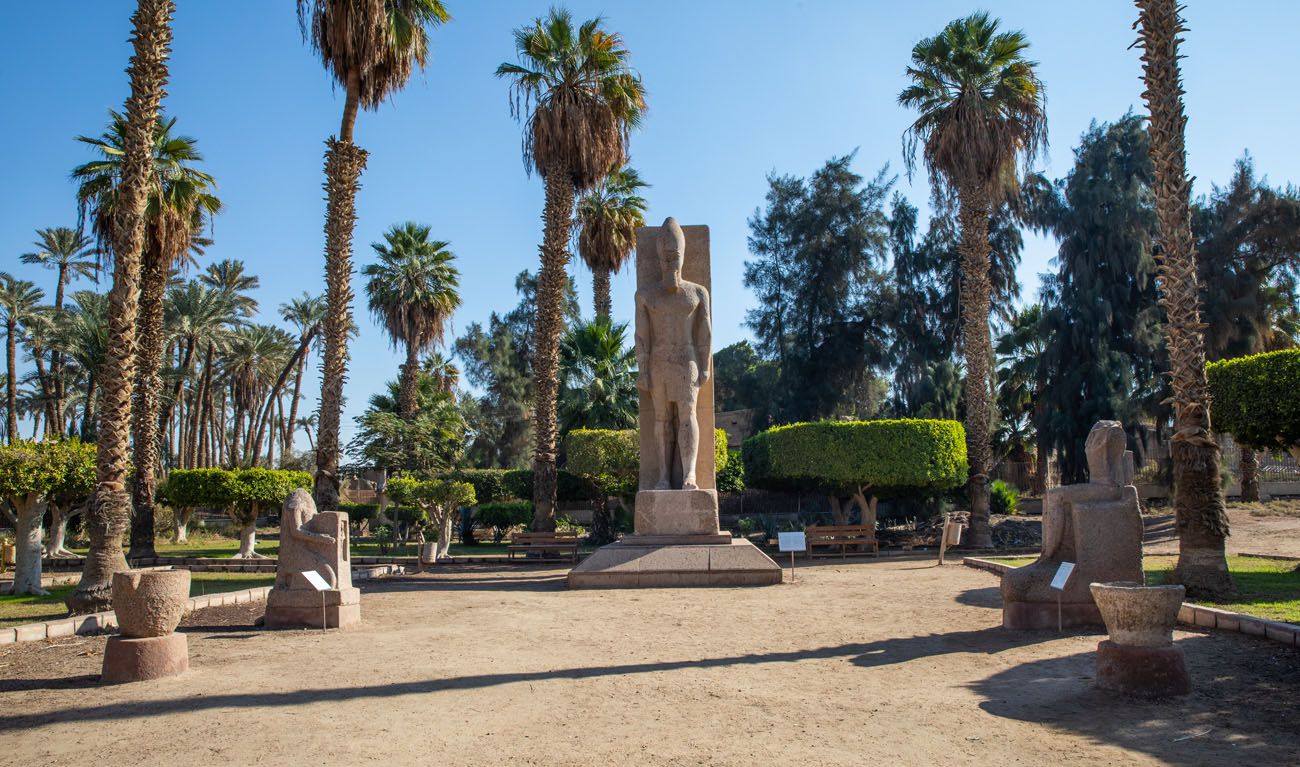
Highlights of a visit here include the alabaster sphinx and seeing the massive statue of Ramesses II.
Saqqara
Saqqara is the necropolis for the ancient Egyptian city of Memphis. This area contains numerous pyramids, including the Step Pyramid of Djoser (Zoser), the oldest stone building complex in the world.
Imhotep formed the Step Pyramid by stacking six mastabas, one on top of the other, until the structure reached the height of 62.5 meters. It was encased in white limestone. The construction of the Step Pyramid is what inspired the future pharaohs to build the more modern pyramids (such as the Bent and Red pyramids).
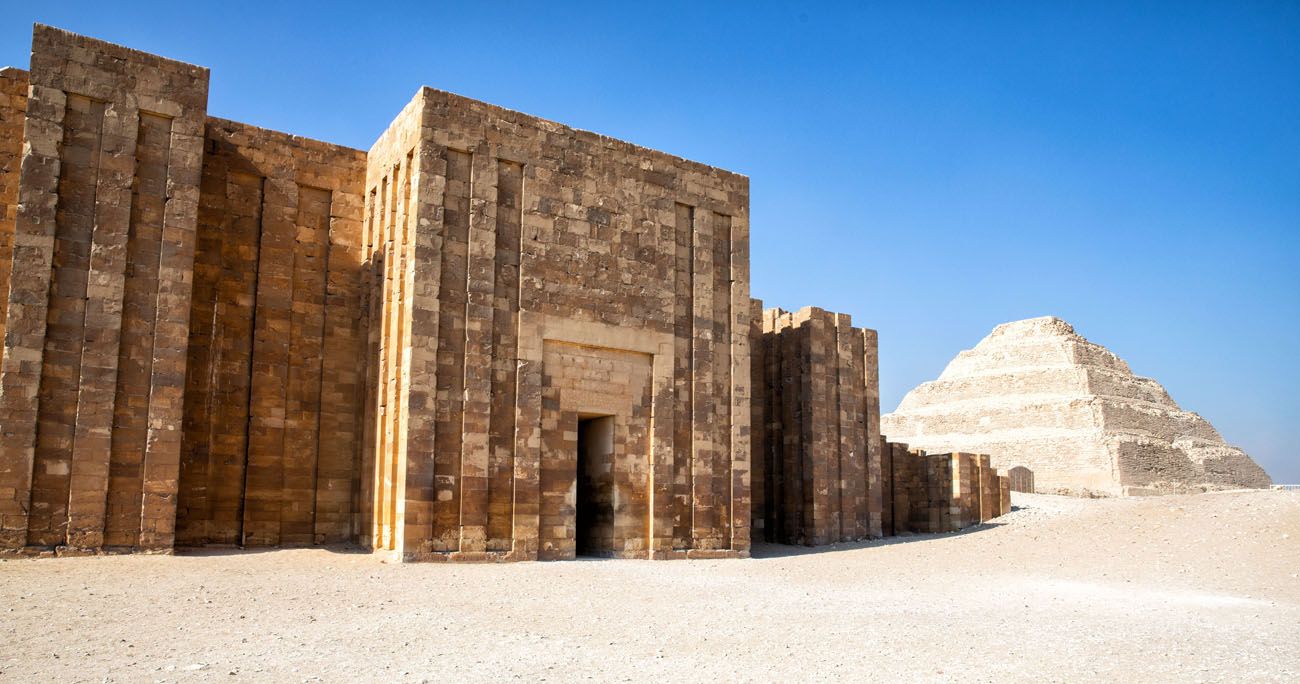
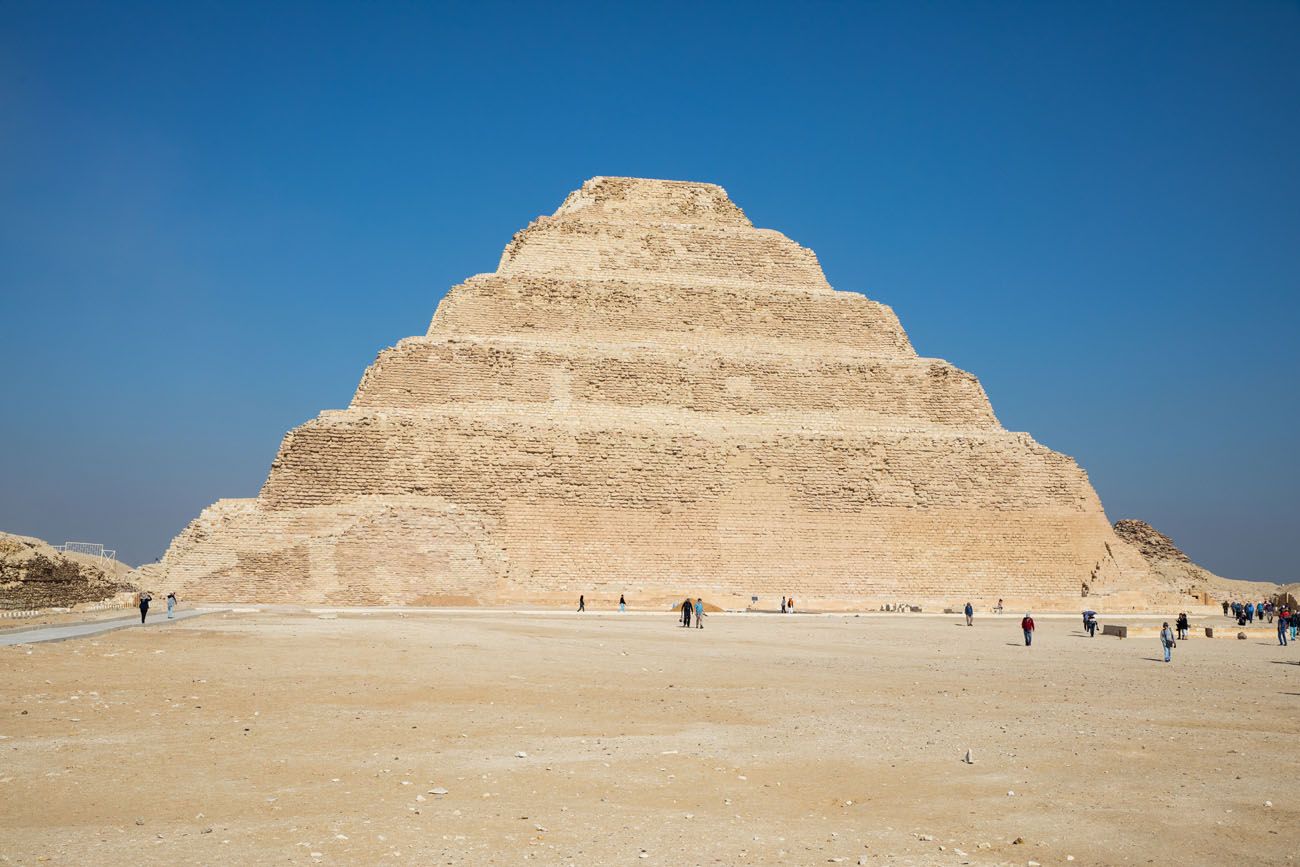
Also at Saqqara you can visit the tombs of other nobles and generals from the Middle Kingdom and New Kingdom.
How to Visit Dahshur, Memphis, and Saqqara
The easiest way to visit Dahshur, Memphis, and Saqqara is on a tour. Your transportation is taken care of and you get to tour the sites with a knowledgeable Egyptologist.
We hired Egypt Tailor Made, not only for our tour of Dahshur, Memphis, and Saqqara, but also for the remainder of our time in Egypt. Egypt Tailor Made can customize your day trip to Dahshur, Memphis, and Saqqara, adding on other sites in Cairo for this afternoon.
The day trip to Dahshur and Saqqara takes five to six hours. If you start your day at 8 am, you will arrive back to Cairo/Giza between 1 and 2 pm.
Afternoon: Islamic Cairo or Coptic Cairo
Spend the afternoon visiting either Islamic Cairo or Coptic Cairo, as laid out in Itinerary #1 above.
Evening: Dinner
End your day with dinner, either in Cairo, Giza, or at your hotel.
Optional: Sound and Light Show at the Pyramids of Giza
Each night, the Sphinx and the pyramids are illuminated in a rainbow of colors. For one hour, the Sphinx narrates the history of the pyramids.
The Sound and Light Show gets mixed reviews. Some people love it, some say it’s boring, almost everyone says that it is outdated (it started in the 1960’s and hasn’t changed much since then).
Tickets start at $20 USD and can be reserved in advance. Click here to learn more. If you need transportation from your hotel, this tour includes tickets for the Sound and Light Show and transportation to and from your hotel.
How to Get Around Cairo
The easiest way to get around Cairo is with a guide and private driver. However, you can get around independently and travel by taxi, Uber, bus, or metro. For a great article on how to use the public transportation network in Cairo, click here.
Should You Hire a Guide?
Hiring a guide and driver has many benefits in Cairo: your transportation is taken care of, you get to visit the sites with a knowledgeable guide, and you get to learn a lot about the local culture and customs. We hired Egypt Tailor Made, not only for our tour of Cairo, but also for the remainder of our time in Egypt.
Is the Cairo Pass Worth It?
The Cairo Pass gives you free entry to the sites in Cairo, Giza, Dahshur, Saqqara, and Mit Rahina. These sites include the Egyptian Museum, the Museum of Islamic Art, the Coptic Museum, Saladin Citadel, all sites on the Giza Plateau, all sites at Saqqara, the Red and Bent Pyramids in Dahshur, and the sites in Historic Cairo.
The Cairo Pass costs $130 USD. It is valid for 5 days.
With just two days in Cairo, you will not visit enough sites to make the Cairo Pass worth it. However, if you are also planning a visit to Luxor, it might be worth it. If you purchase the Cairo Pass, you get a 50% discount on the Luxor Pass, which could be worth it for some people.
LEARN MORE: Complete Guide to the Luxor Pass and Cairo Pass
Where to Stay in Cairo & Giza
Marriott Mena House. This is where we stayed and it was fantastic. It was 8 pm and dark by the time we arrived at the hotel, but what a thrilling experience to see the Great Pyramid from our balcony. Breakfast is a buffet with endless choices of food (it’s one of the best hotel breakfasts we have had yet). Plus, you can sit outside and stare up at the Great Pyramid over a cup of coffee.
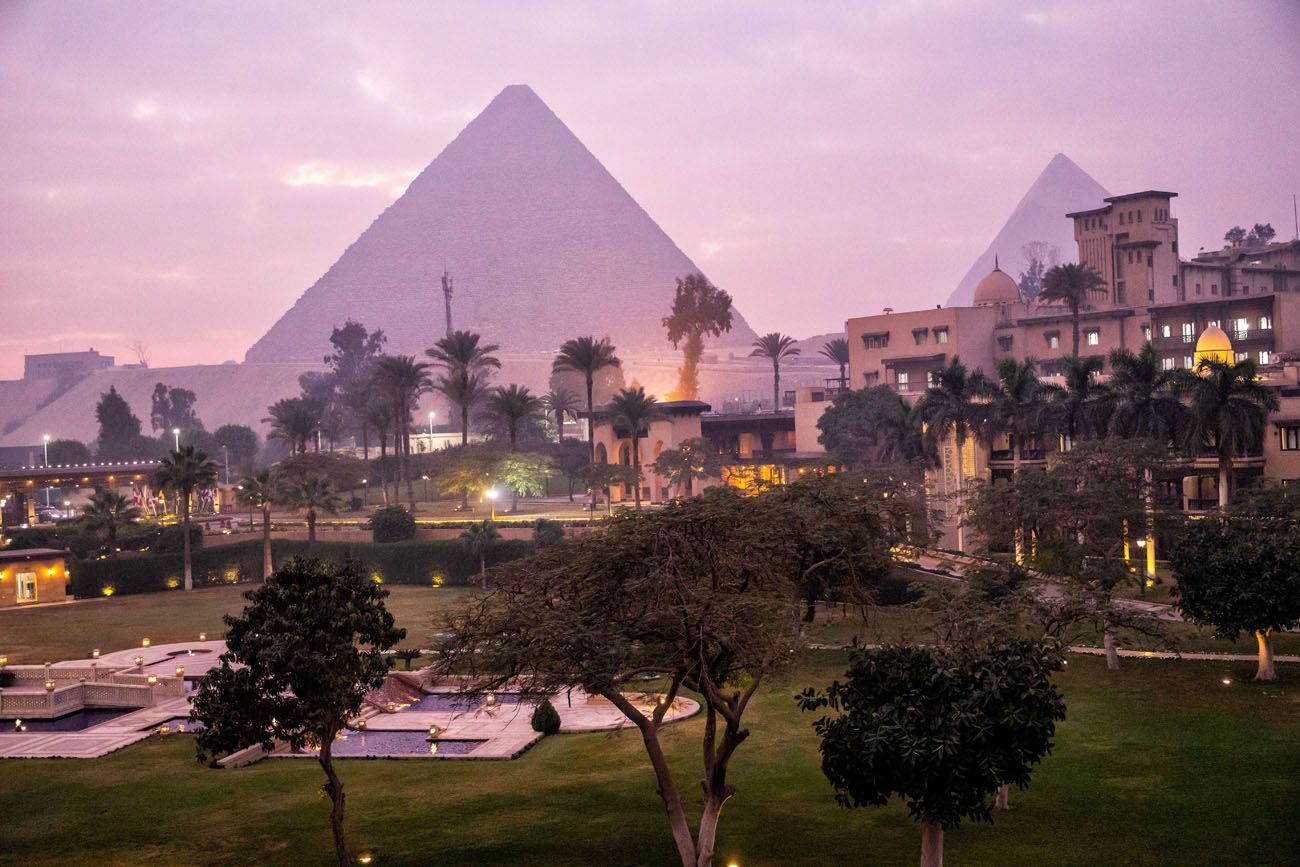
View from the Marriott Mena House
Pyramids View Inn. This small hotel offers views of the Sphinx and the pyramids. The view from the rooftop terrace is amazing and this is a great place to watch the Sound and Light Show, without joining the crowds.
Great Pyramid Inn. This is yet another hotel that boasts amazing views of the Pyramids of Giza. From the top floor terrace you have an awesome view of the pyramids. Some rooms have views of the pyramids and/or a balcony.
The Nile Ritz-Carlton. If you have dreams of staying in a Ritz-Carlton without spending a small fortune, Cairo is the place to do it. This hotel is located right on Tahrir Square so it is just a short walk to the Egyptian Museum (until the Grand Egyptian Museum opens) and the Cairo Tower.
If you have any questions about how to spend 2 days in Cairo, let us know in the comment section below.
More Information about Egypt
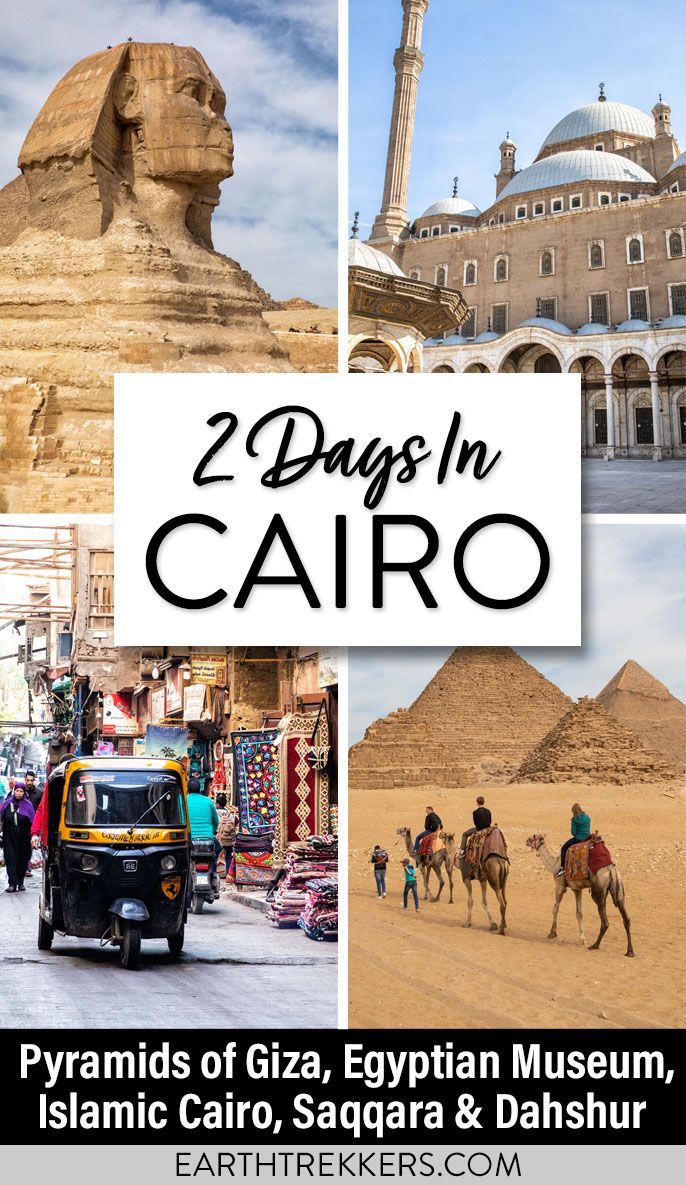
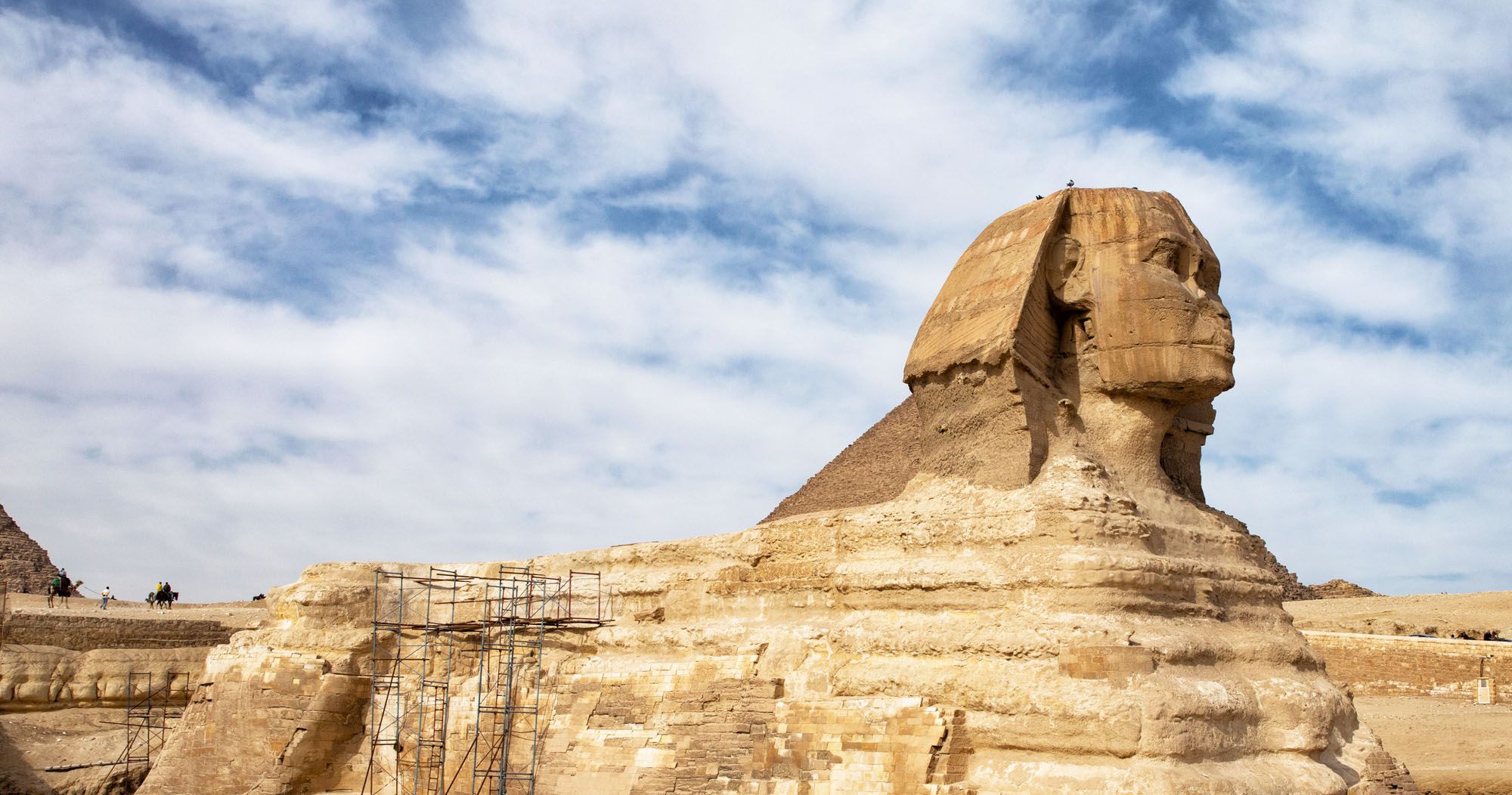

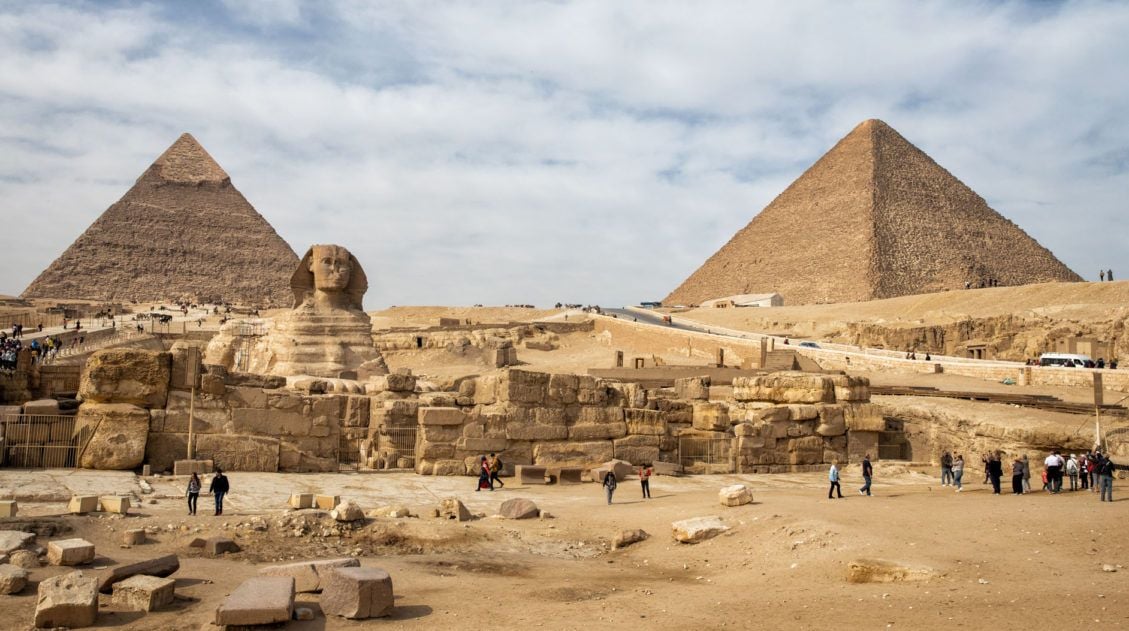
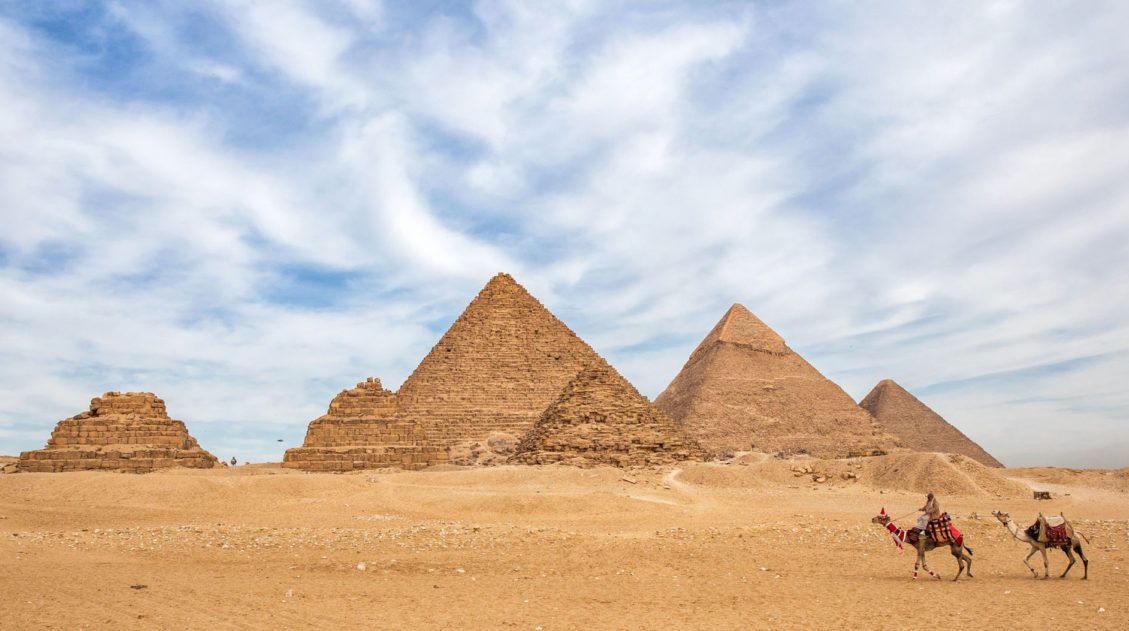
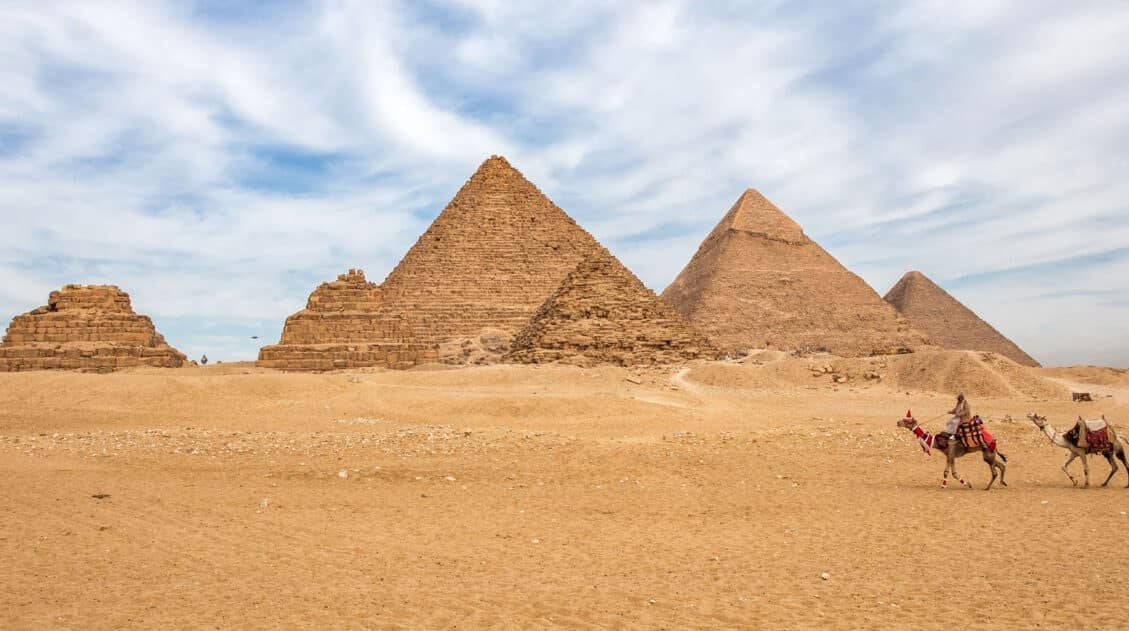
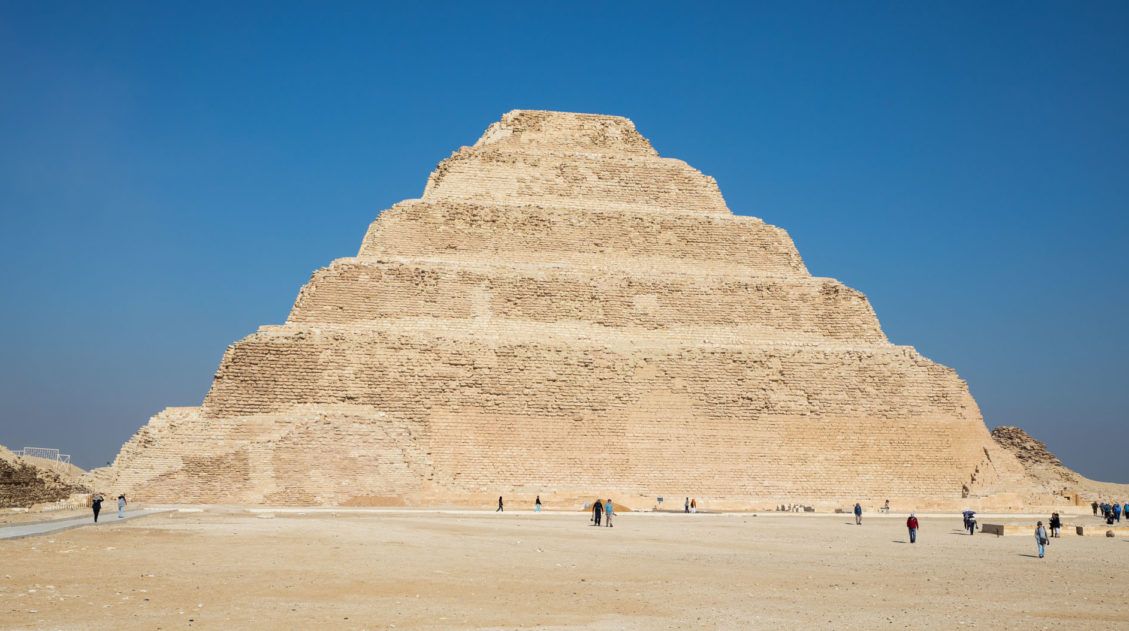
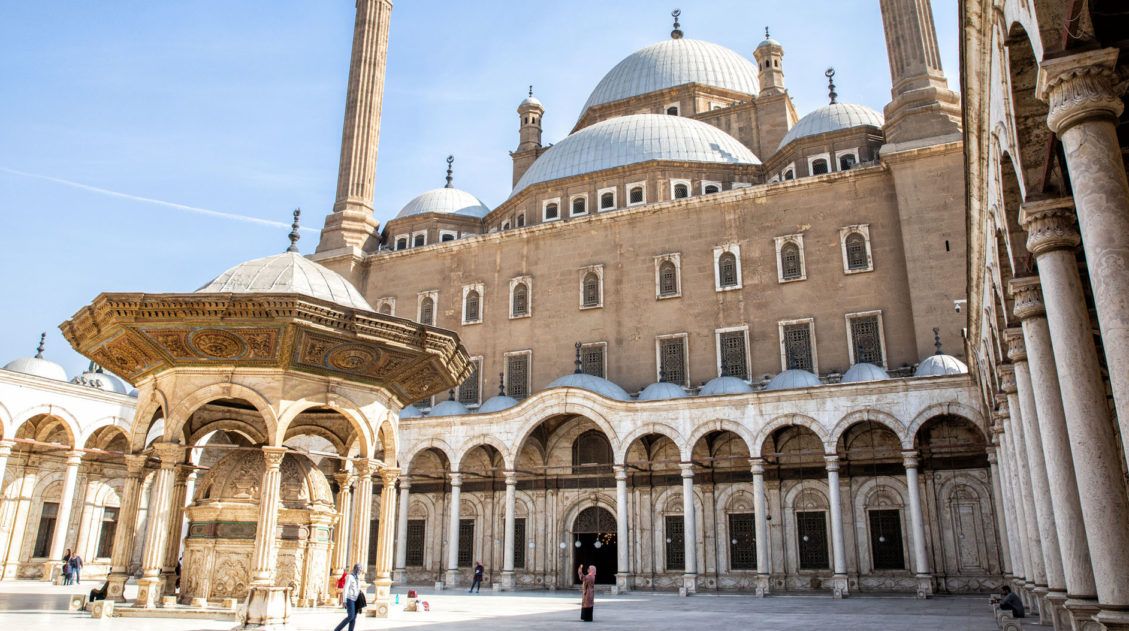
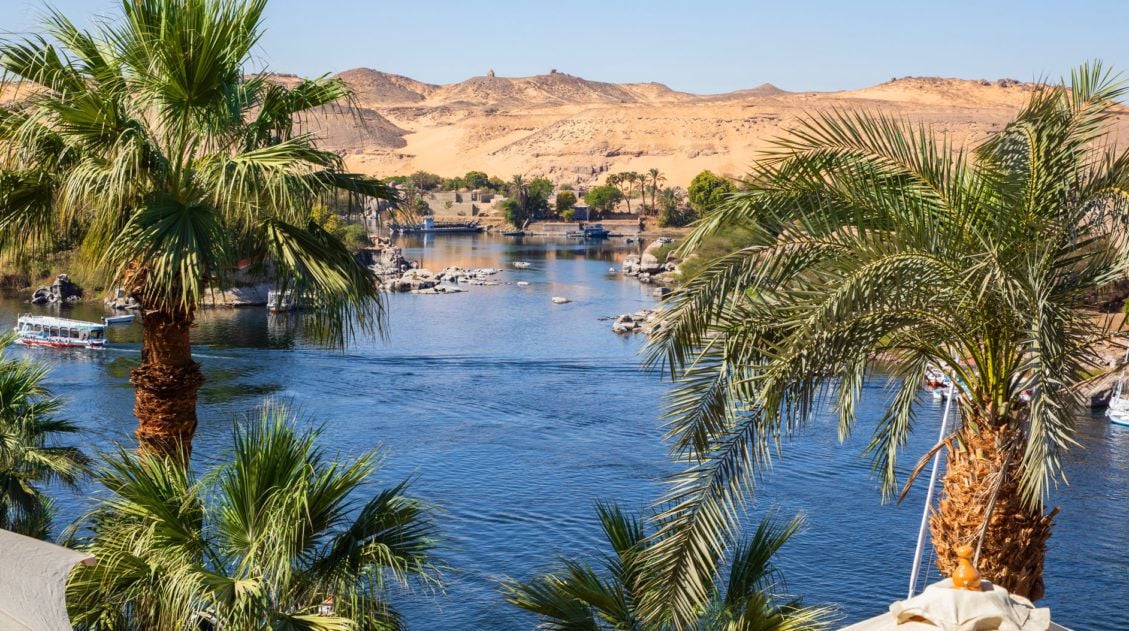
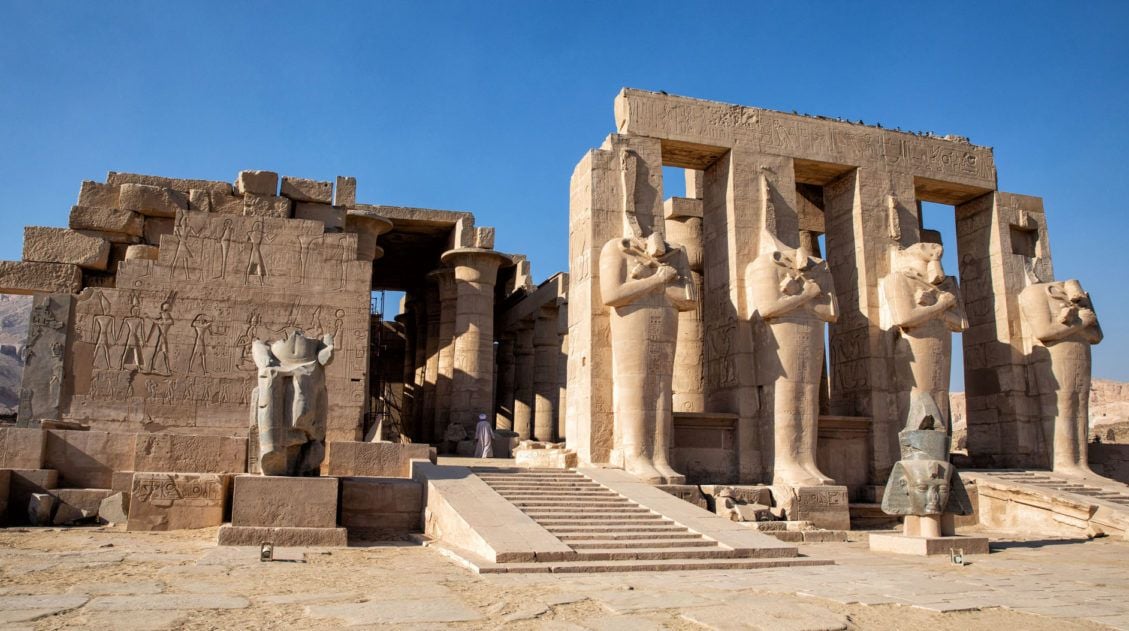
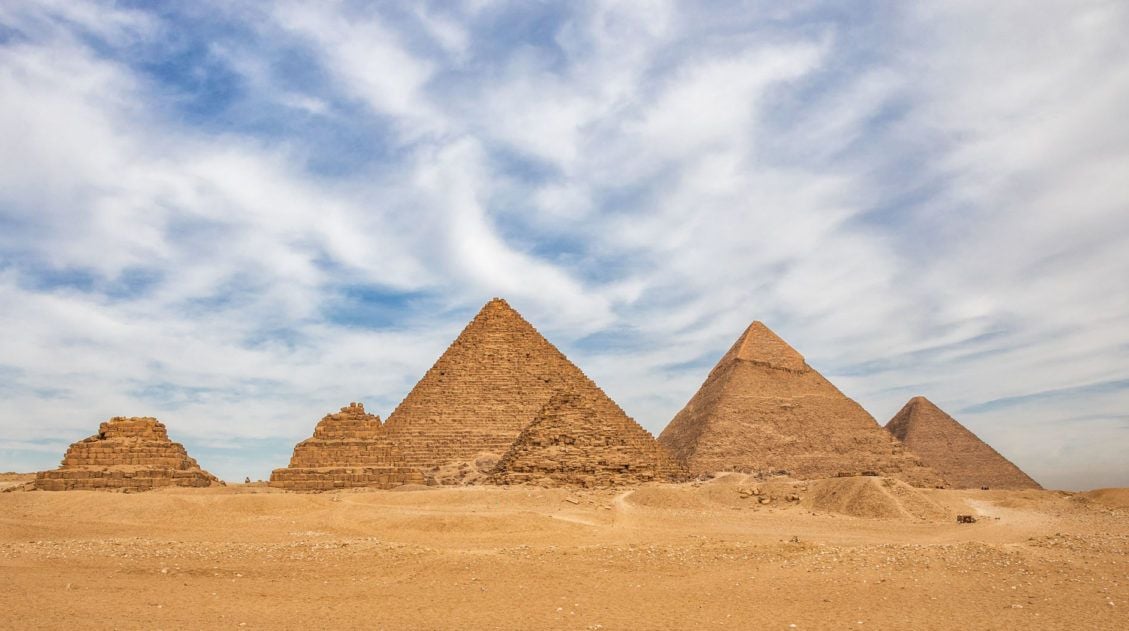
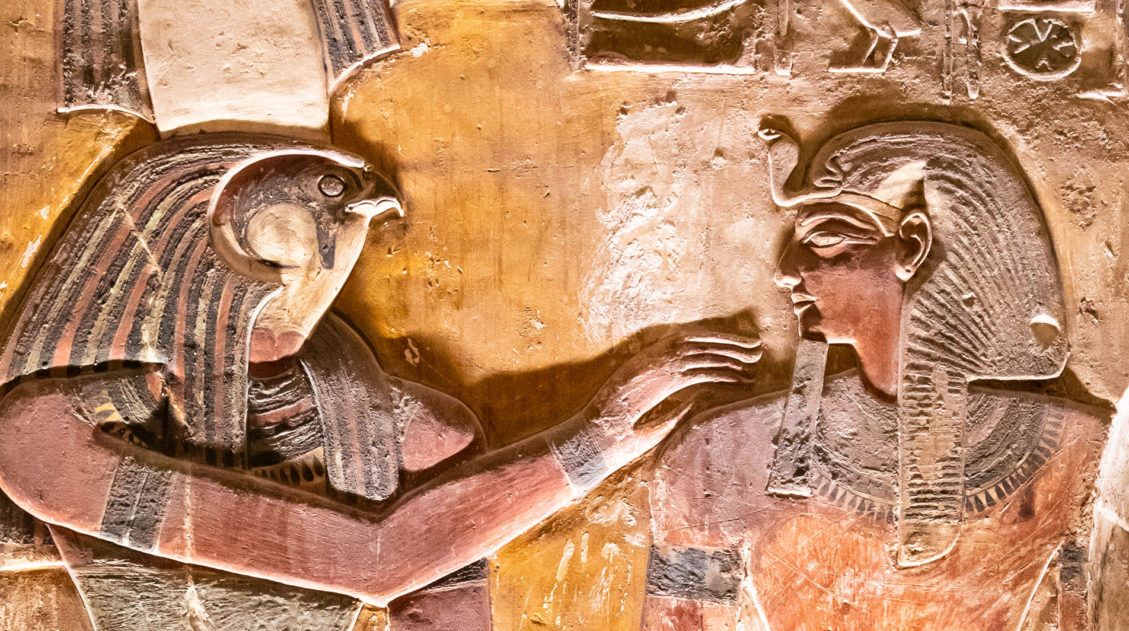
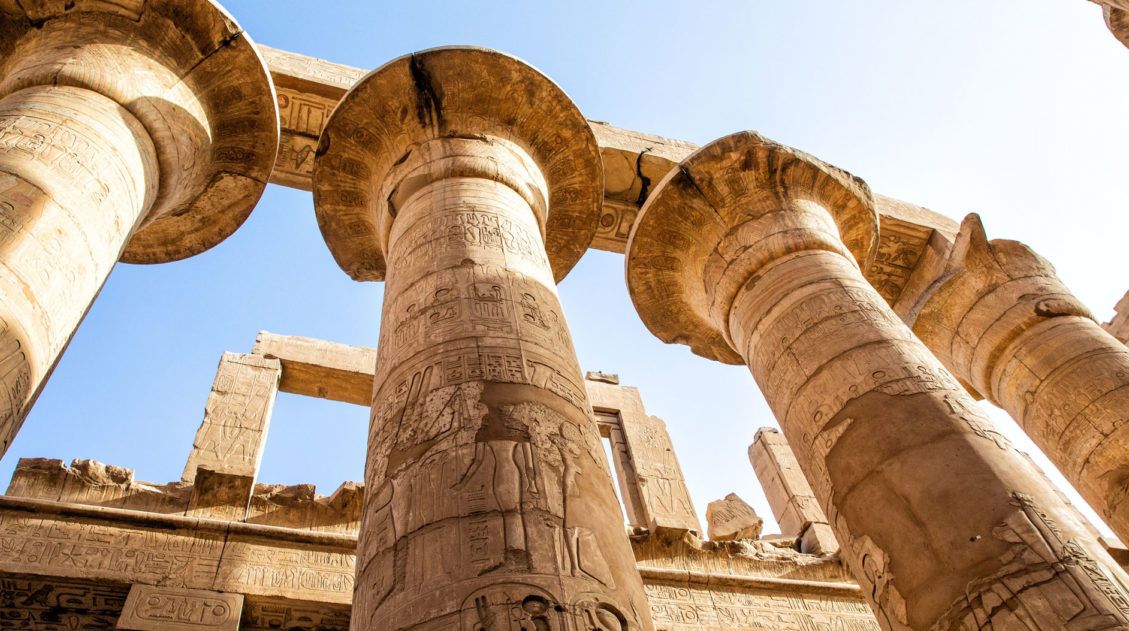
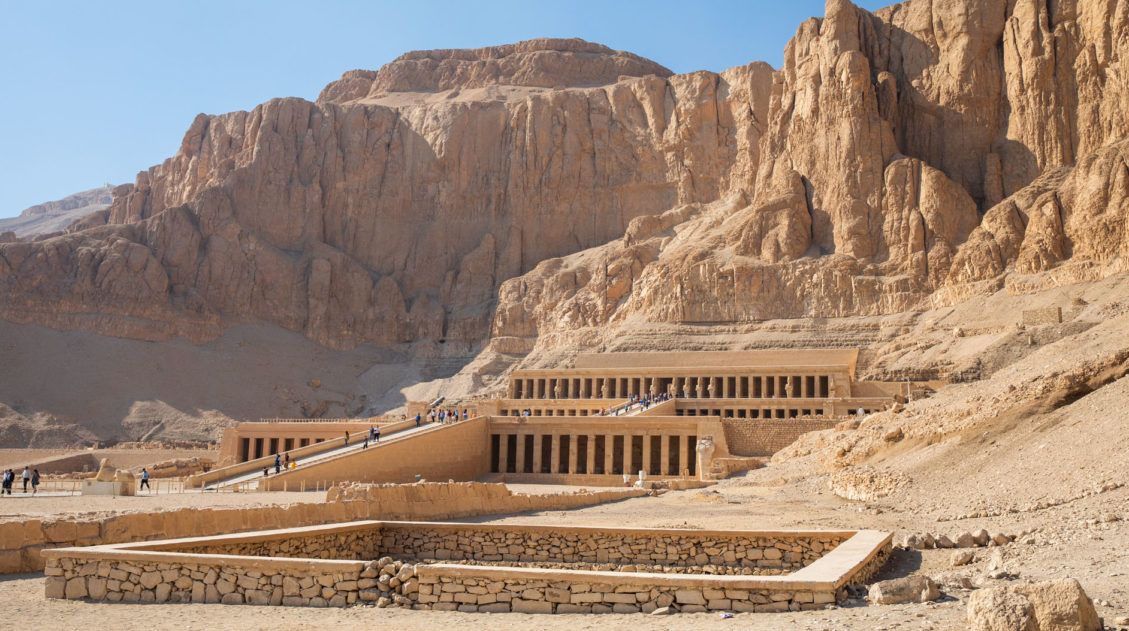
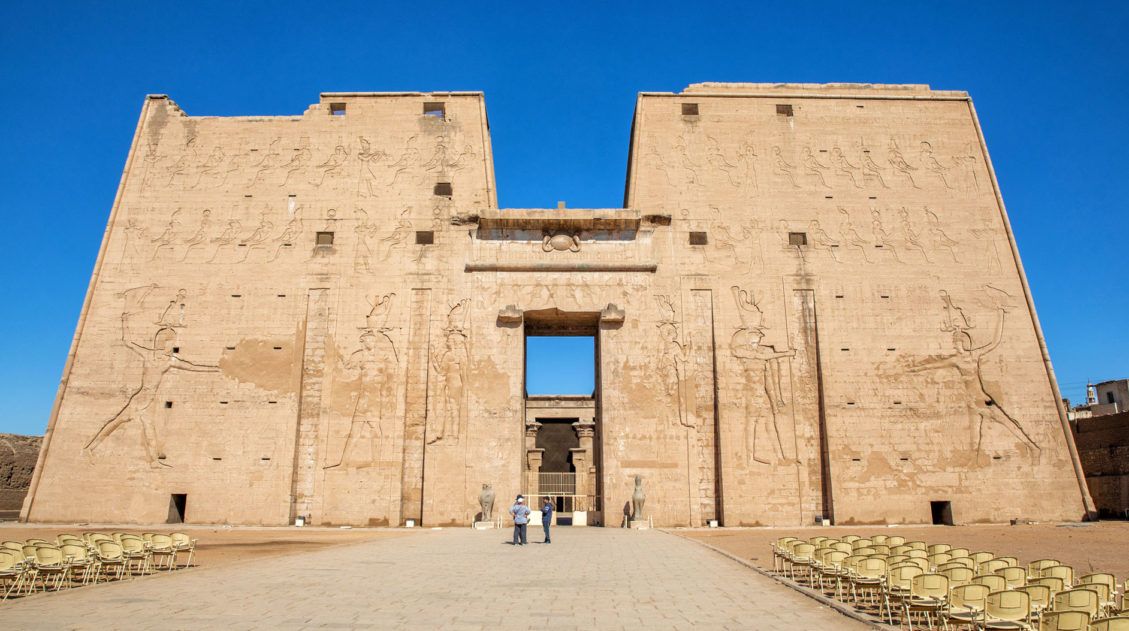
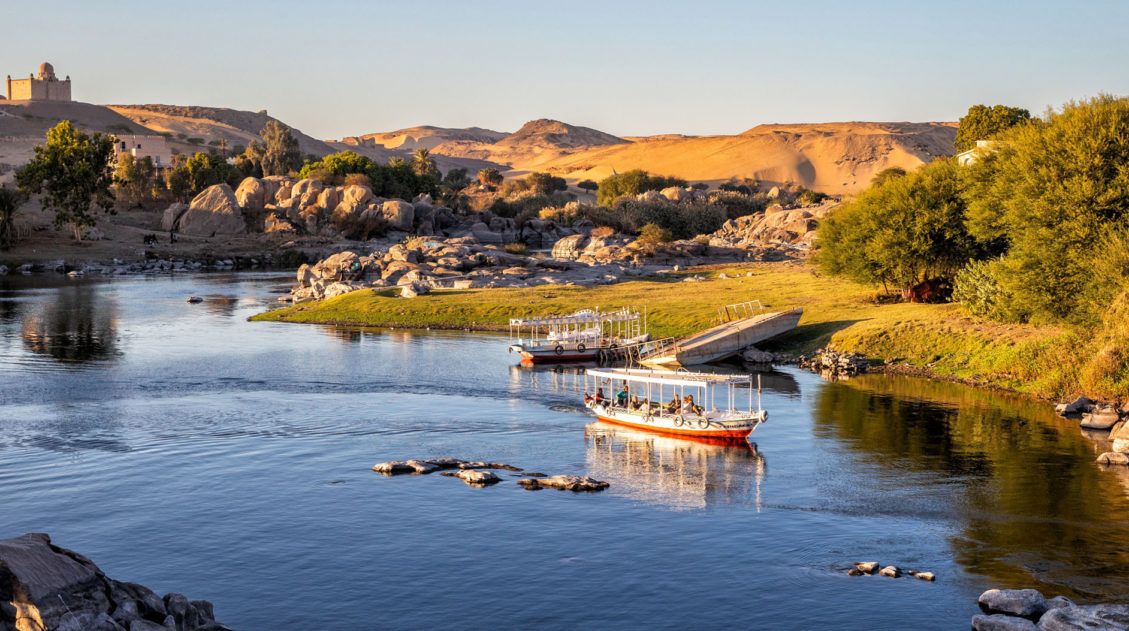
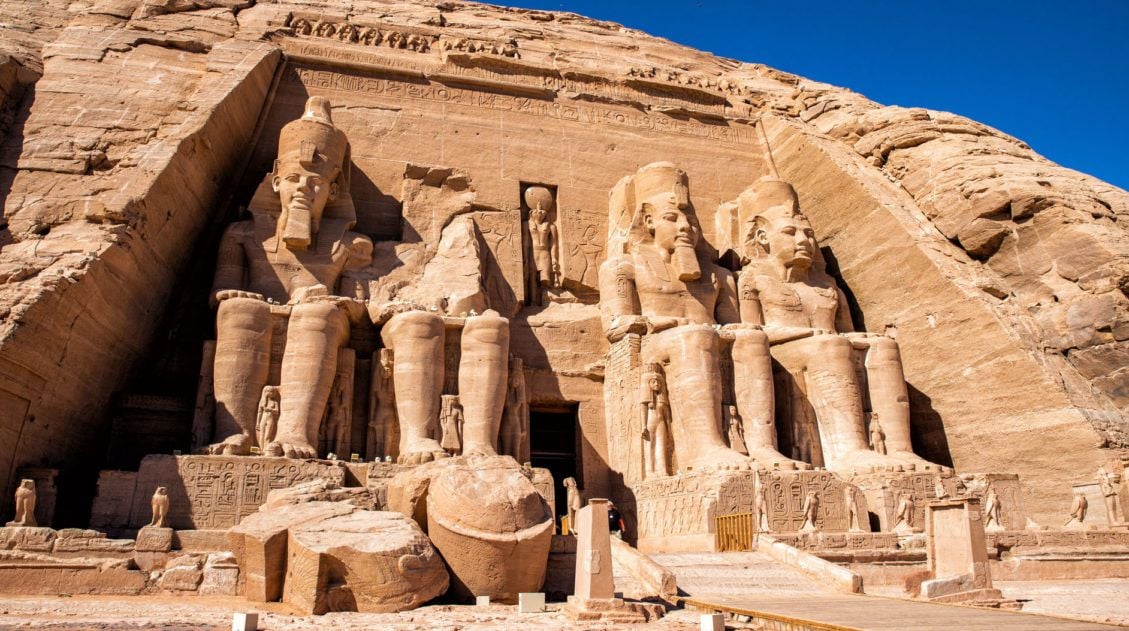
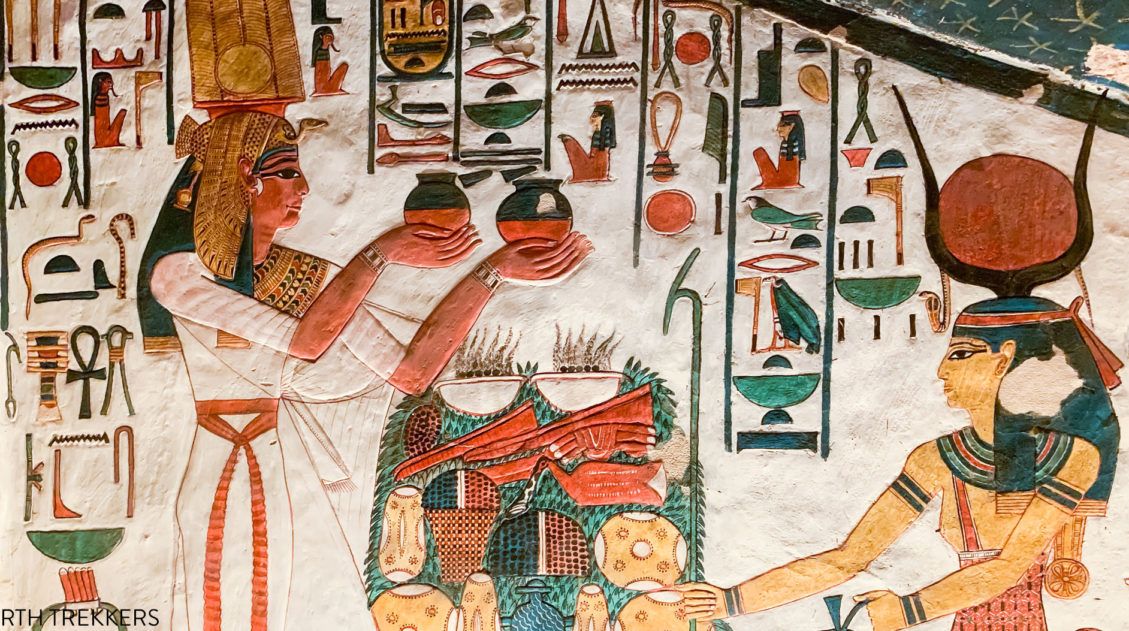
Comments 12